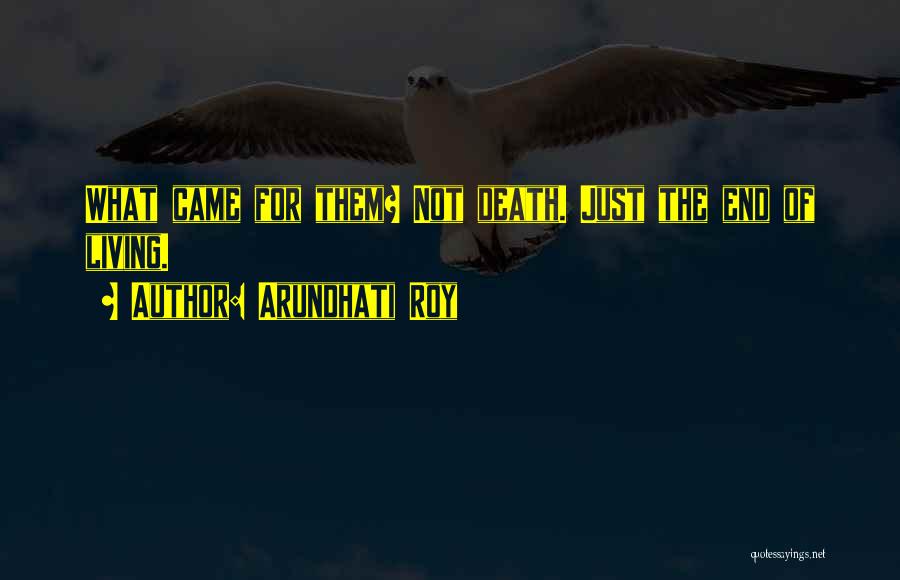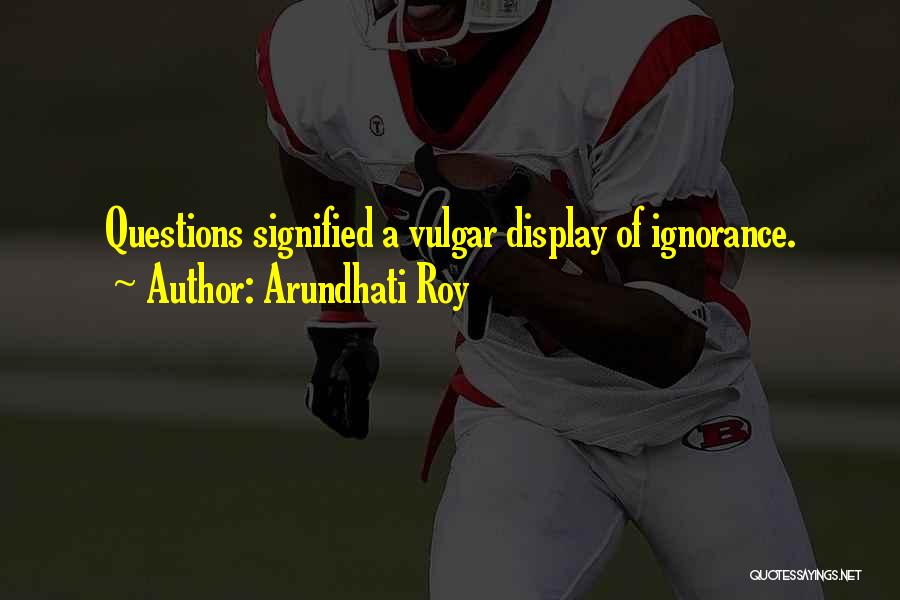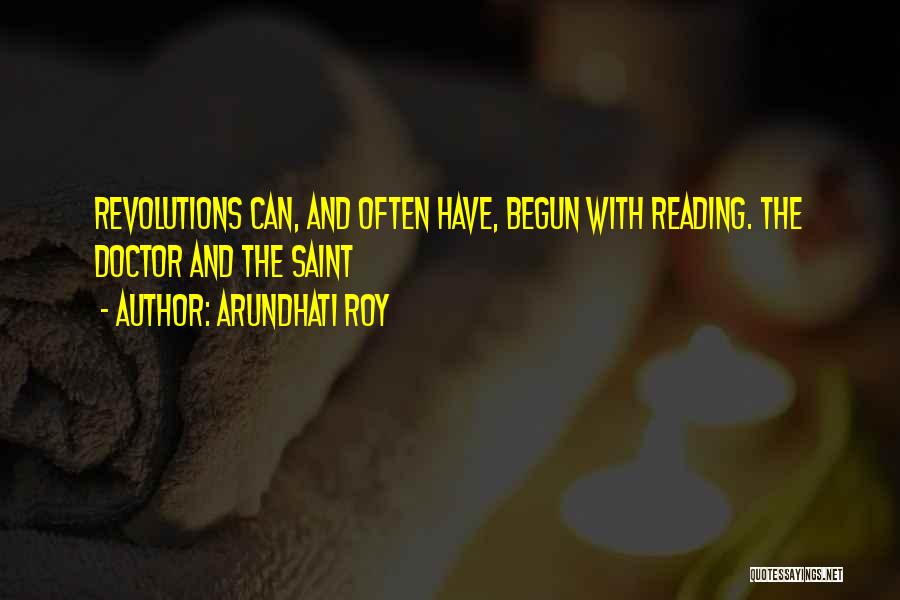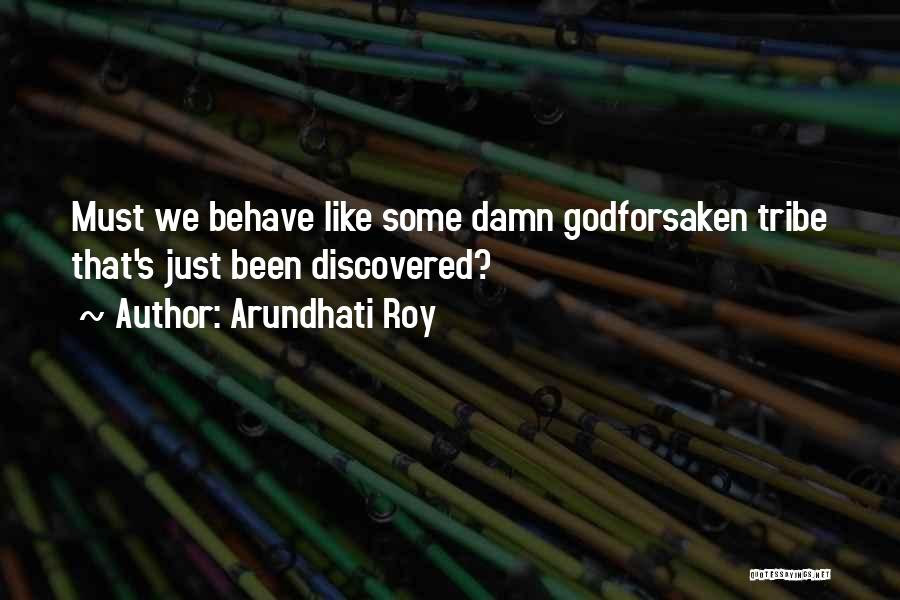Arundhati Roy Quotes & Sayings
Enjoy the top 100 famous quotes, sayings and quotations by Arundhati Roy.
Famous Quotes By Arundhati Roy
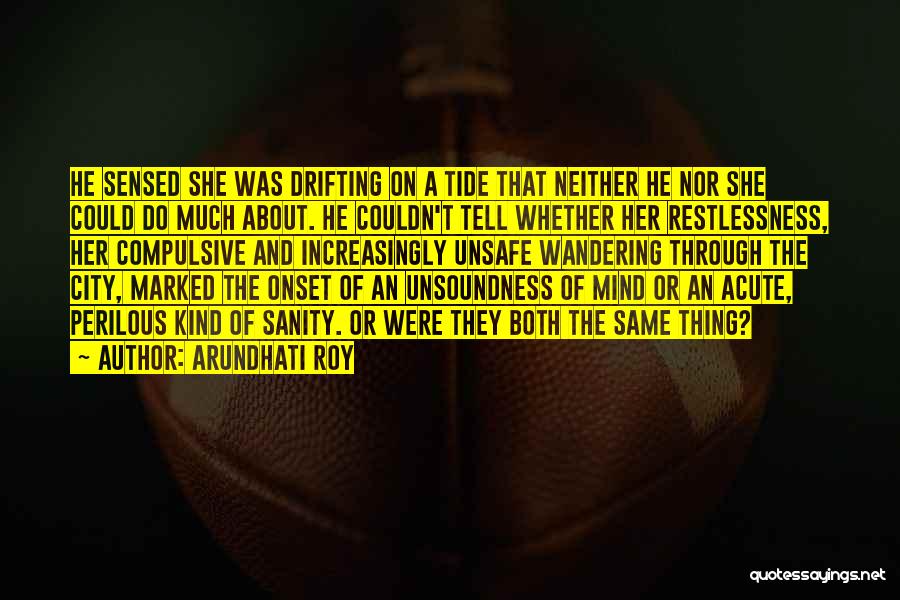
He sensed she was drifting on a tide that neither he nor she could do much about. He couldn't tell whether her restlessness, her compulsive and increasingly unsafe wandering through the city, marked the onset of an unsoundness of mind or an acute, perilous kind of sanity. Or were they both the same thing? — Arundhati Roy
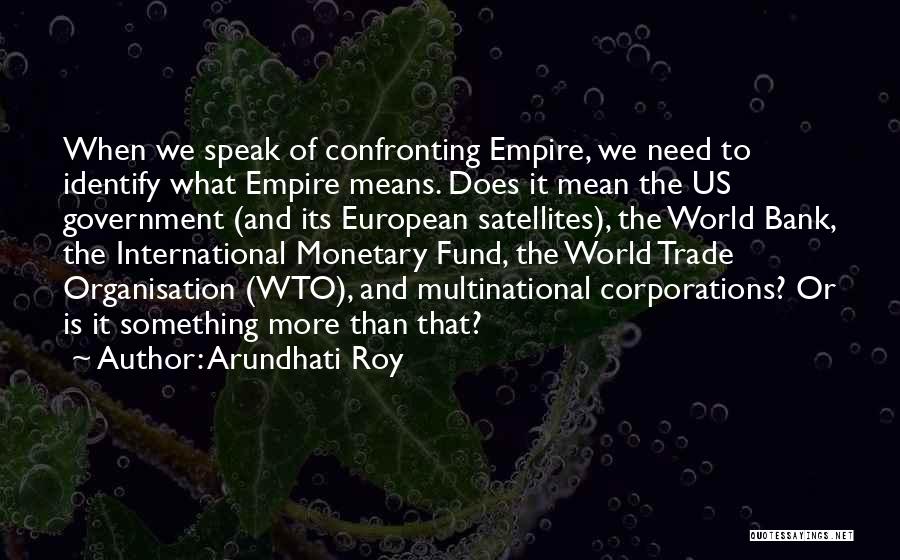
When we speak of confronting Empire, we need to identify what Empire means. Does it mean the US government (and its European satellites), the World Bank, the International Monetary Fund, the World Trade Organisation (WTO), and multinational corporations? Or is it something more than that? — Arundhati Roy
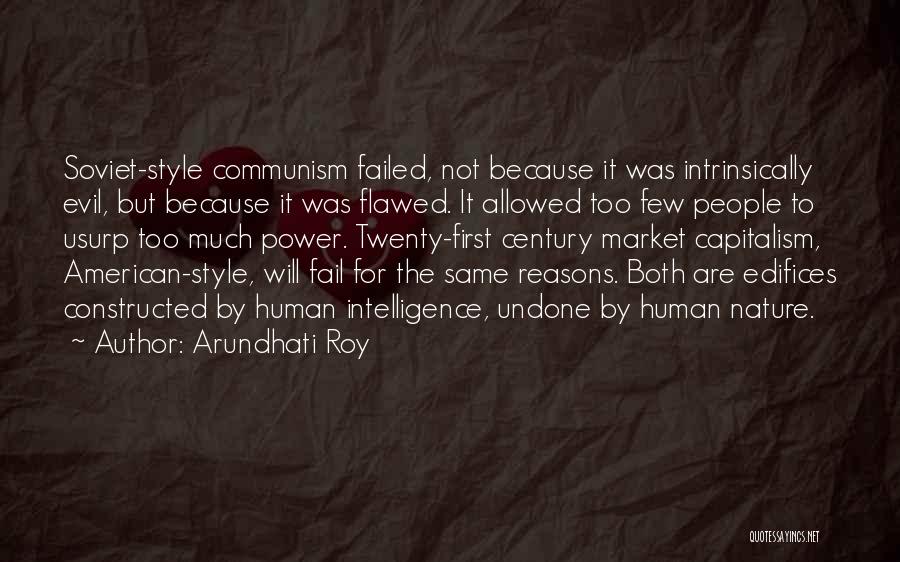
Soviet-style communism failed, not because it was intrinsically evil, but because it was flawed. It allowed too few people to usurp too much power. Twenty-first century market capitalism, American-style, will fail for the same reasons. Both are edifices constructed by human intelligence, undone by human nature. — Arundhati Roy

She was perhaps too young to realize that what she assumed was her love for [him] was actually a tentative, timorous, acceptance of herself. — Arundhati Roy
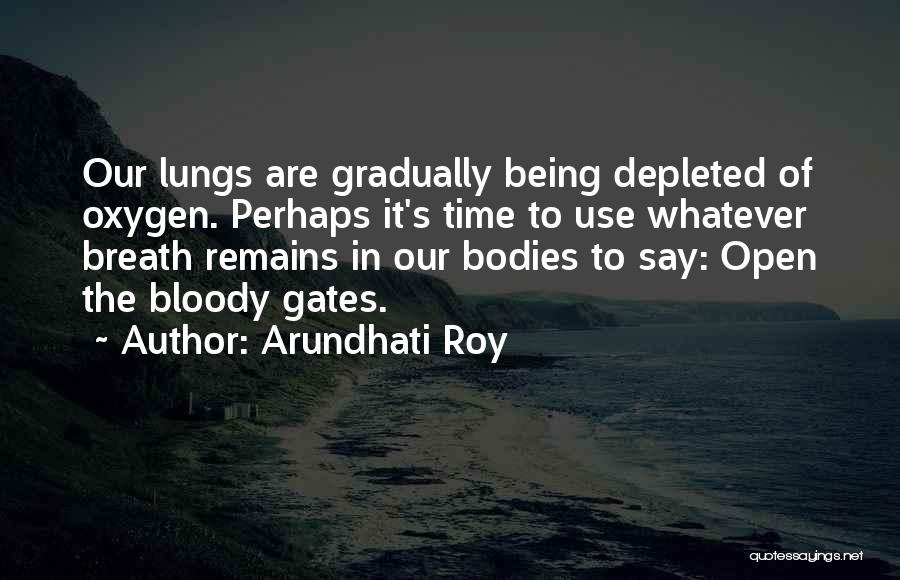
Our lungs are gradually being depleted of oxygen. Perhaps it's time to use whatever breath remains in our bodies to say: Open the bloody gates. — Arundhati Roy
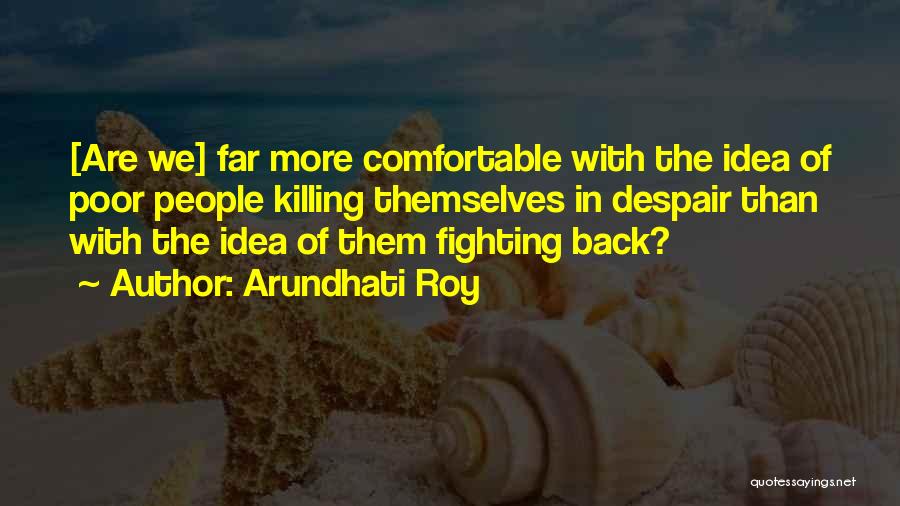
[Are we] far more comfortable with the idea of poor people killing themselves in despair than with the idea of them fighting back? — Arundhati Roy

As for the third Official Reason: exposing Western Hypocrisy - how much more exposed can they be? Which decent human being on earth harbors any illusions about it? These are people whose histories are spongy with the blood of others. Colonialism, apartheid, slavery, ethnic cleansing, germ warfare, chemical weapons - they virtually invented it all. — Arundhati Roy

Anything's possible in Human Nature," Chacko said in his Reading Aloud voice. Talking to the darkness now, suddenly insensitive to his little fountain-haired niece. "Love. Madness. Hope. Infinite joy."
Of the four things that were Possible in Human Nature, Rahel thought that Infinnate Joy sounded the saddest. Perhaps because of the way Chacko said it.
Infinnate Joy. With a church sound to it. Like a sad fish with fins all over. — Arundhati Roy
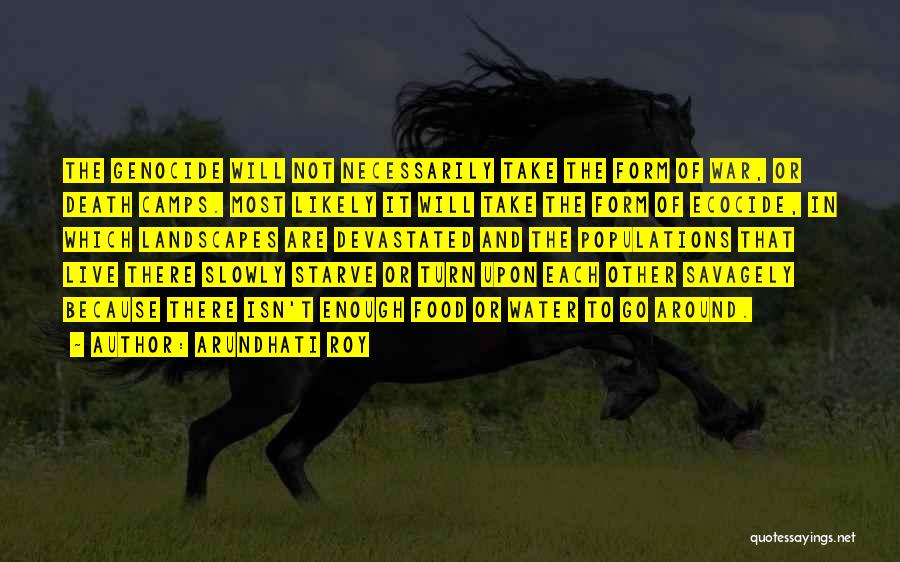
The genocide will not necessarily take the form of war, or death camps. Most likely it will take the form of ecocide, in which landscapes are devastated and the populations that live there slowly starve or turn upon each other savagely because there isn't enough food or water to go around. — Arundhati Roy
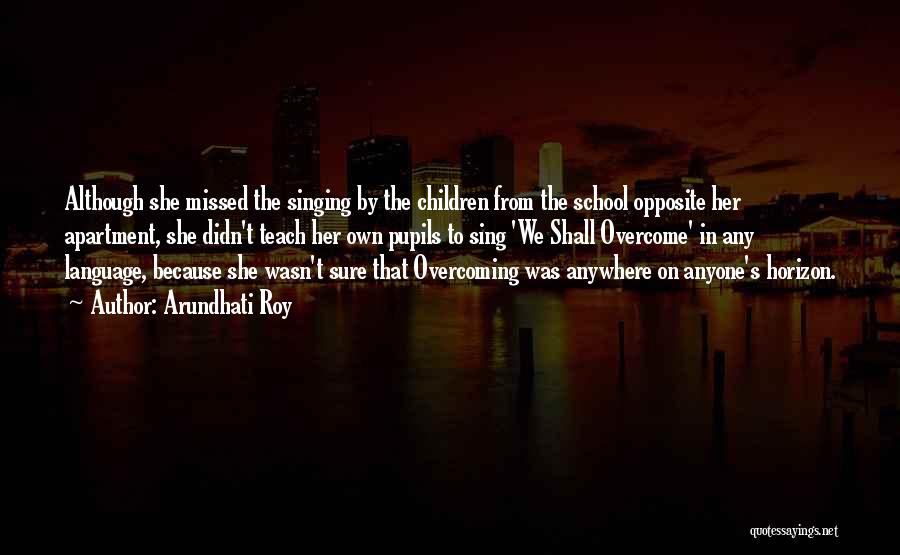
Although she missed the singing by the children from the school opposite her apartment, she didn't teach her own pupils to sing 'We Shall Overcome' in any language, because she wasn't sure that Overcoming was anywhere on anyone's horizon. — Arundhati Roy
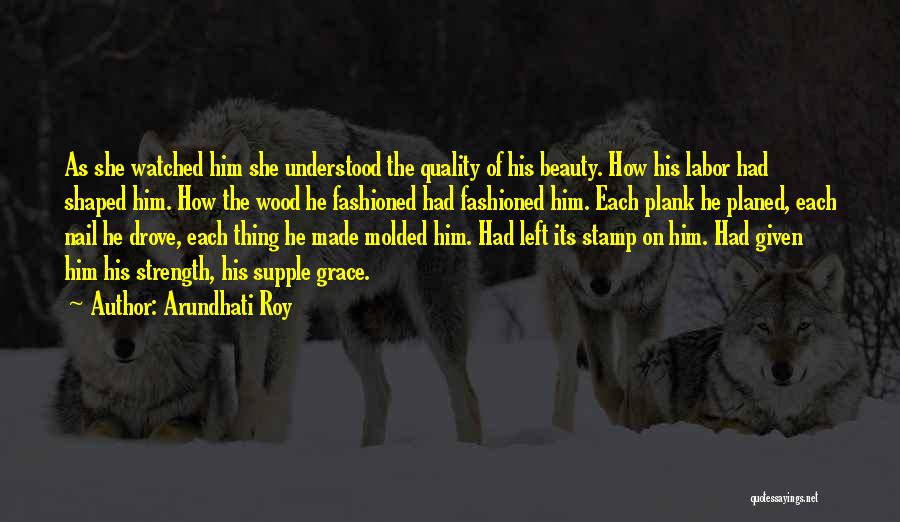
As she watched him she understood the quality of his beauty. How his labor had shaped him. How the wood he fashioned had fashioned him. Each plank he planed, each nail he drove, each thing he made molded him. Had left its stamp on him. Had given him his strength, his supple grace. — Arundhati Roy
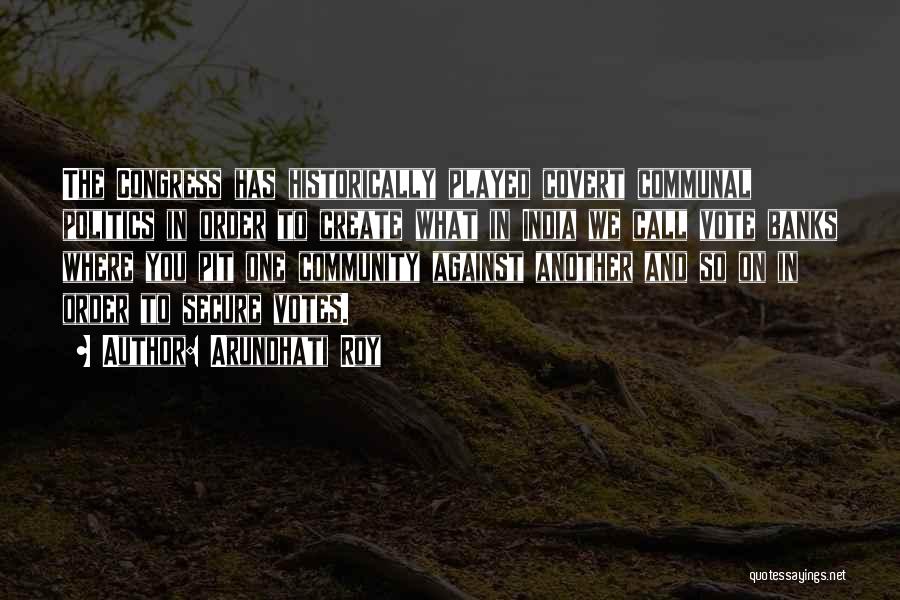
The Congress has historically played covert communal politics in order to create what in India we call vote banks where you pit one community against another and so on in order to secure votes. — Arundhati Roy
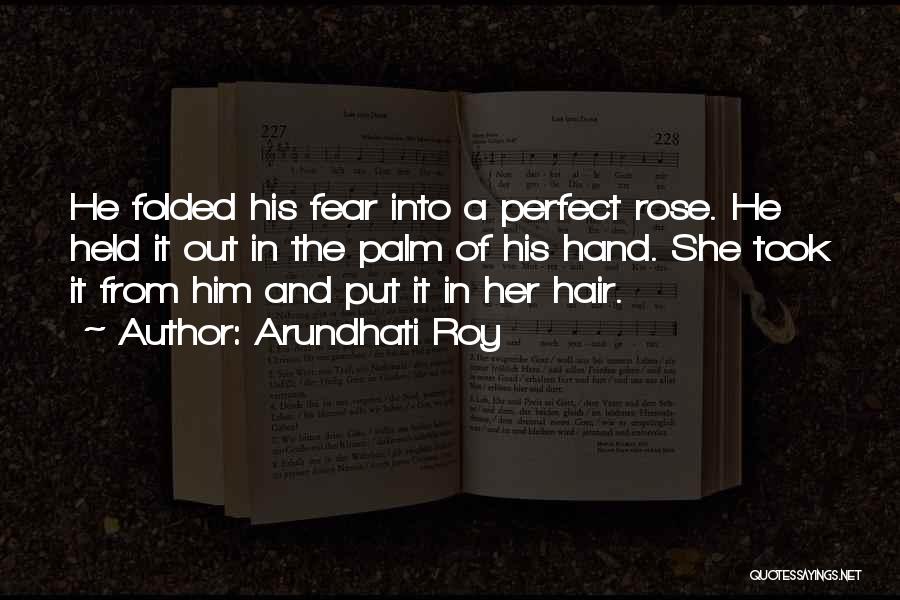
He folded his fear into a perfect rose. He held it out in the palm of his hand. She took it from him and put it in her hair. — Arundhati Roy
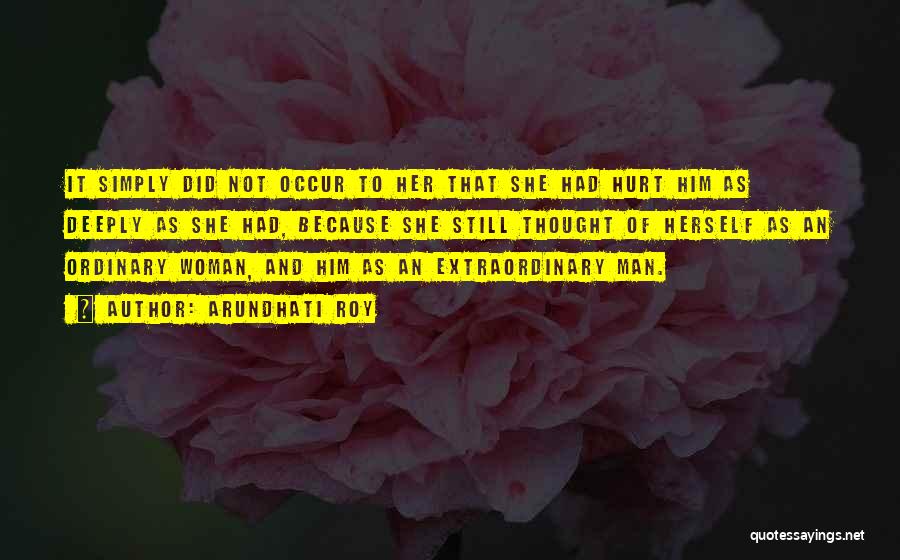
It simply did not occur to her that she had hurt him as deeply as she had, because she still thought of herself as an ordinary woman, and him as an extraordinary man. — Arundhati Roy
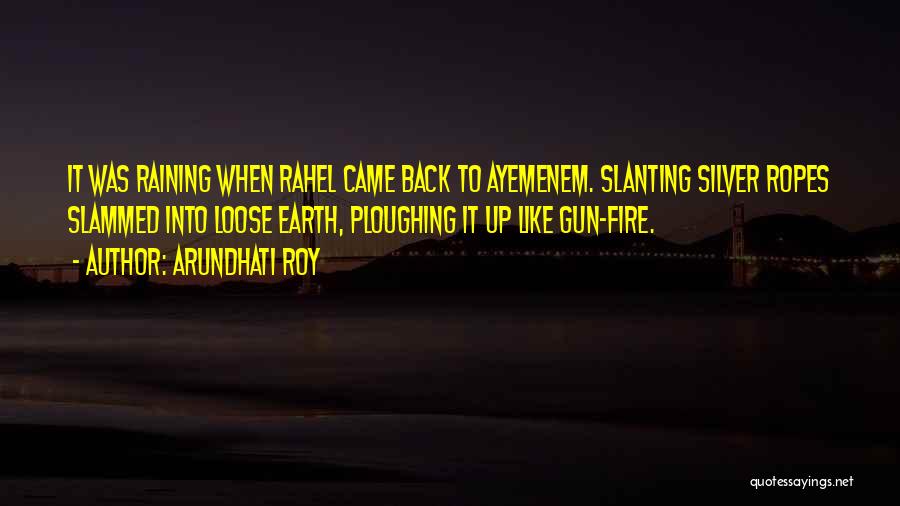
It was raining when Rahel came back to Ayemenem. Slanting silver ropes slammed into loose earth, ploughing it up like gun-fire. — Arundhati Roy

I am completely a loner. In my head I want to feel I can be anywhere. There is a sort of recklessness that being a loner allows me. — Arundhati Roy
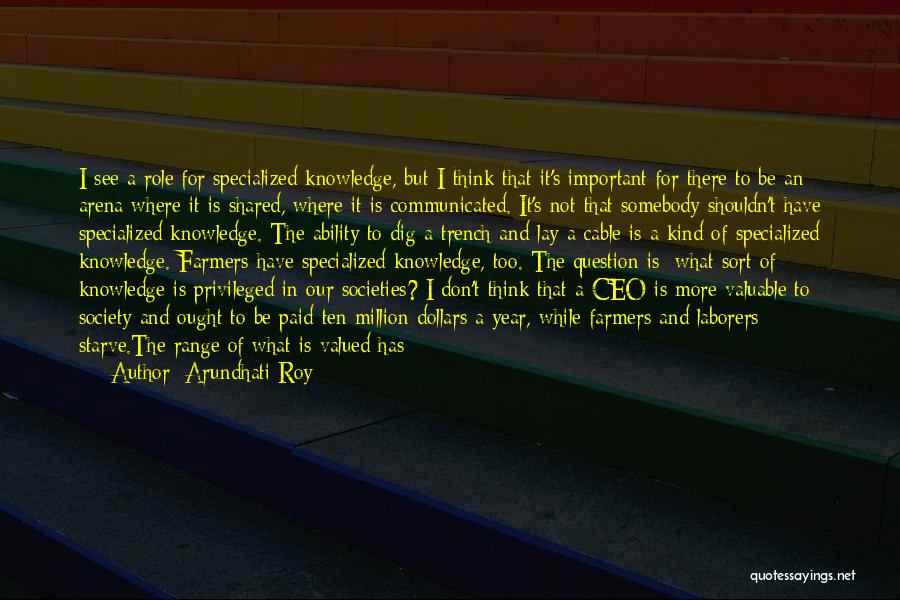
I see a role for specialized knowledge, but I think that it's important for there to be an arena where it is shared, where it is communicated. It's not that somebody shouldn't have specialized knowledge. The ability to dig a trench and lay a cable is a kind of specialized knowledge. Farmers have specialized knowledge, too. The question is: what sort of knowledge is privileged in our societies? I don't think that a CEO is more valuable to society and ought to be paid ten million dollars a year, while farmers and laborers starve.
The range of what is valued has become so extreme that one lot of people have captured it and left three-quarters of the world to live in unthinkable poverty, because their work is not valued. What would happen if the sweepers of the city went on strike or the sewage system didn't work? A CEO wouldn't be able to deal with his own shit. — Arundhati Roy
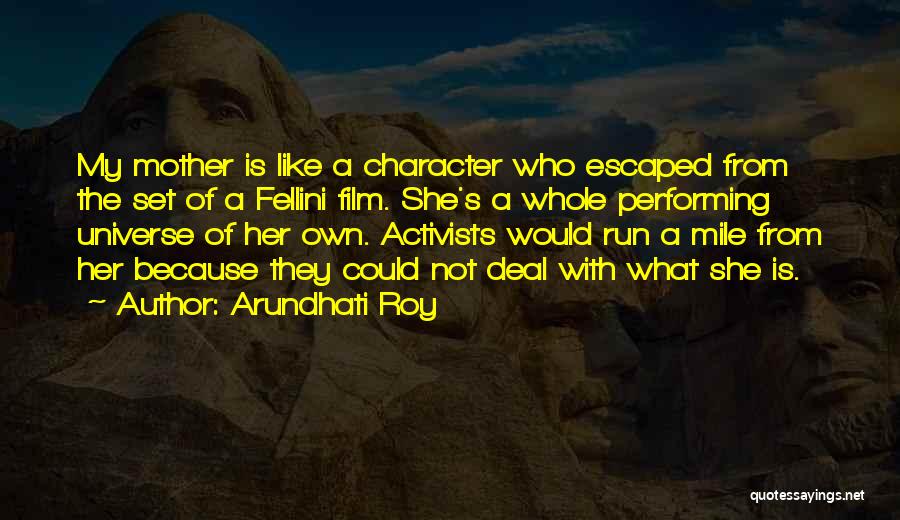
My mother is like a character who escaped from the set of a Fellini film. She's a whole performing universe of her own. Activists would run a mile from her because they could not deal with what she is. — Arundhati Roy
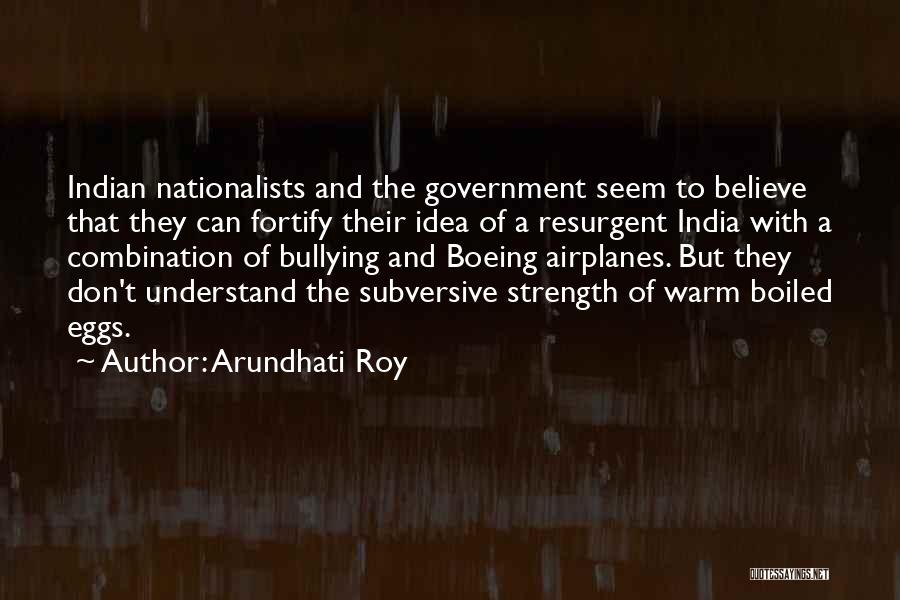
Indian nationalists and the government seem to believe that they can fortify their idea of a resurgent India with a combination of bullying and Boeing airplanes. But they don't understand the subversive strength of warm boiled eggs. — Arundhati Roy
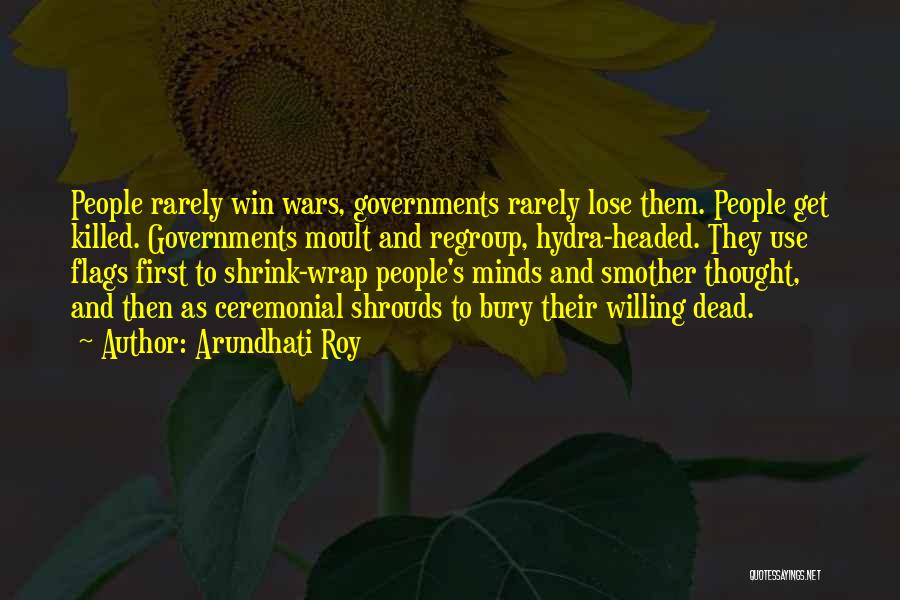
People rarely win wars, governments rarely lose them. People get killed. Governments moult and regroup, hydra-headed. They use flags first to shrink-wrap people's minds and smother thought, and then as ceremonial shrouds to bury their willing dead. — Arundhati Roy
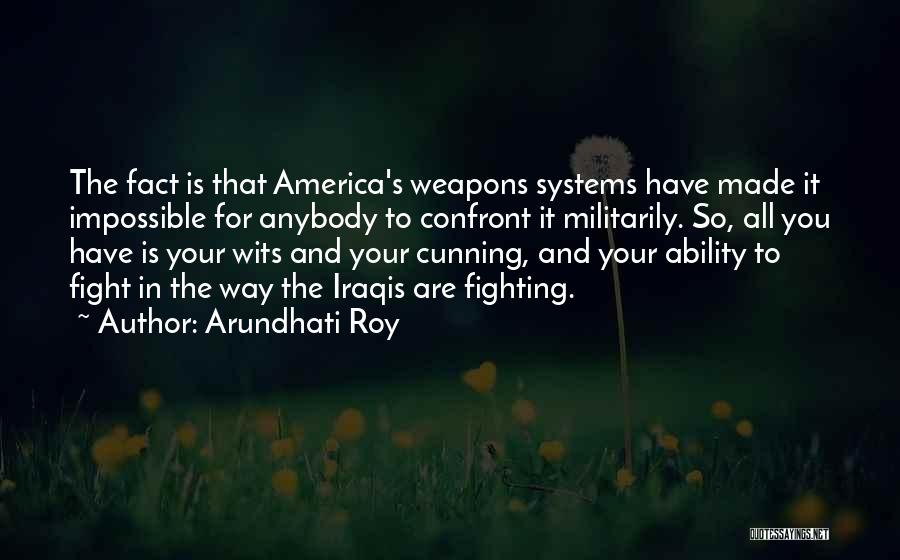
The fact is that America's weapons systems have made it impossible for anybody to confront it militarily. So, all you have is your wits and your cunning, and your ability to fight in the way the Iraqis are fighting. — Arundhati Roy
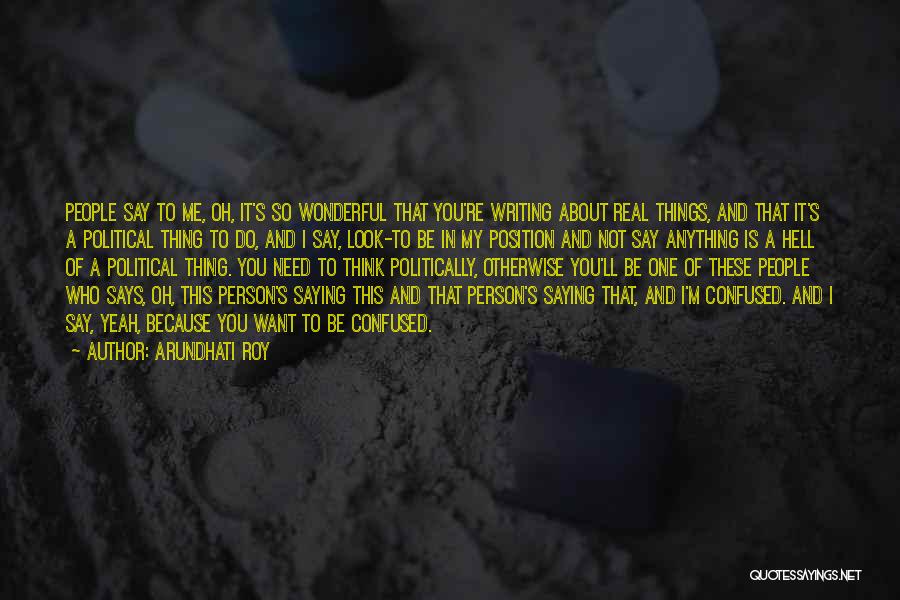
People say to me, Oh, it's so wonderful that you're writing about real things, and that it's a political thing to do, and I say, look-to be in my position and not say anything is a hell of a political thing. You need to think politically, otherwise you'll be one of these people who says, Oh, this person's saying this and that person's saying that, and I'm confused. And I say, yeah, because you want to be confused. — Arundhati Roy
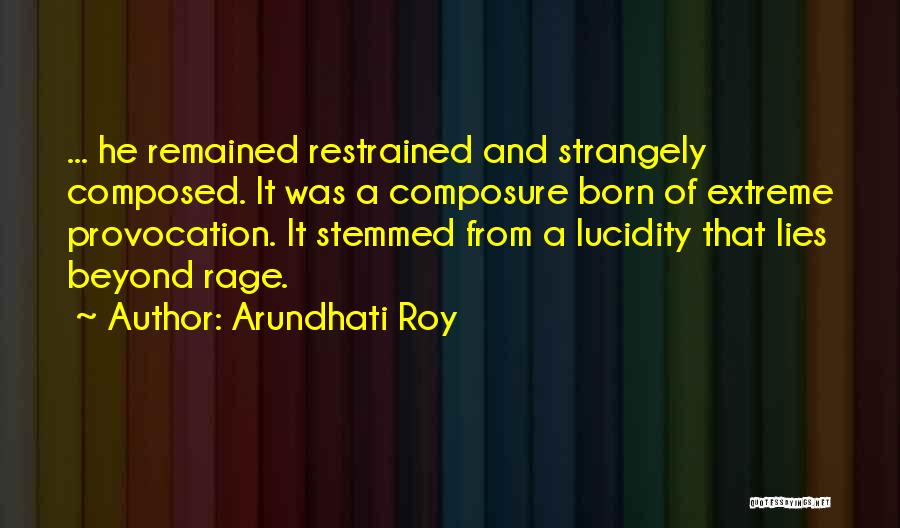
... he remained restrained and strangely composed. It was a composure born of extreme provocation. It stemmed from a lucidity that lies beyond rage. — Arundhati Roy
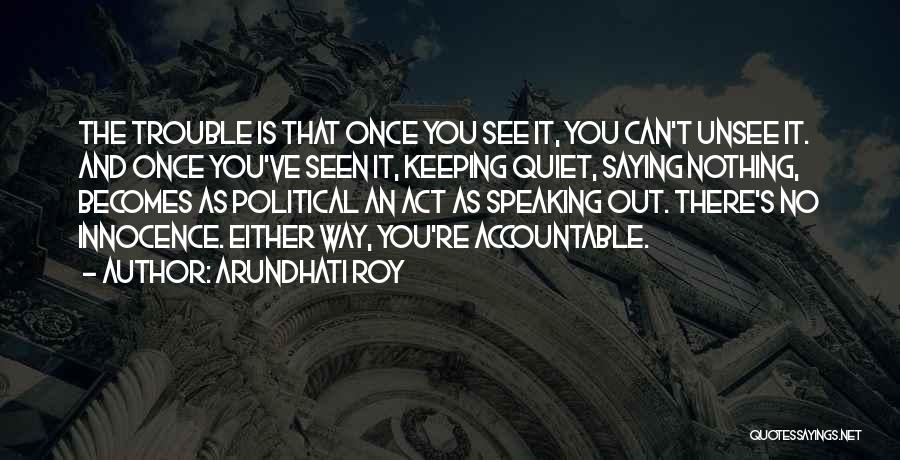
The trouble is that once you see it, you can't unsee it. And once you've seen it, keeping quiet, saying nothing, becomes as political an act as speaking out. There's no innocence. Either way, you're accountable. — Arundhati Roy
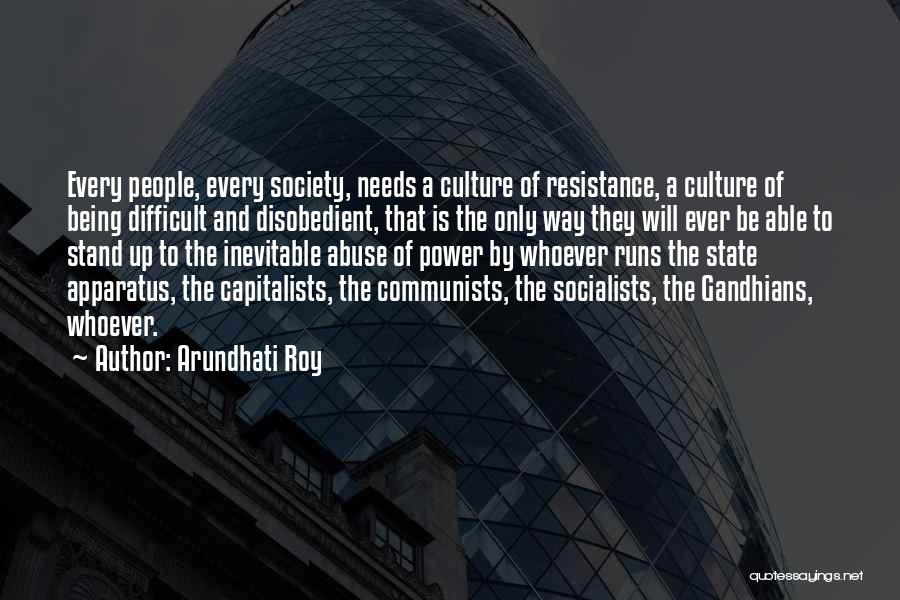
Every people, every society, needs a culture of resistance, a culture of being difficult and disobedient, that is the only way they will ever be able to stand up to the inevitable abuse of power by whoever runs the state apparatus, the capitalists, the communists, the socialists, the Gandhians, whoever. — Arundhati Roy
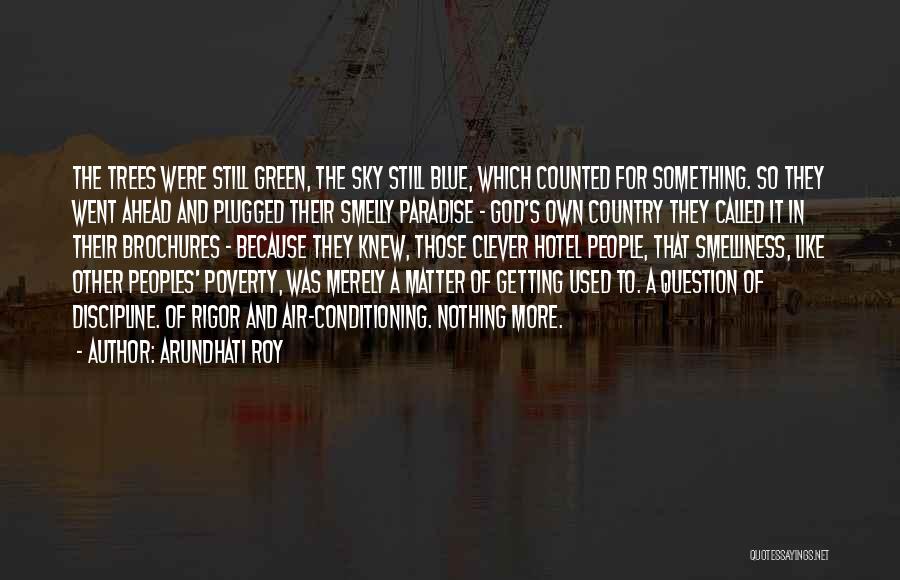
The trees were still green, the sky still blue, which counted for something. So they went ahead and plugged their smelly paradise - God's Own Country they called it in their brochures - because they knew, those clever Hotel People, that smelliness, like other peoples' poverty, was merely a matter of getting used to. A question of discipline. Of Rigor and Air-conditioning. Nothing more. — Arundhati Roy
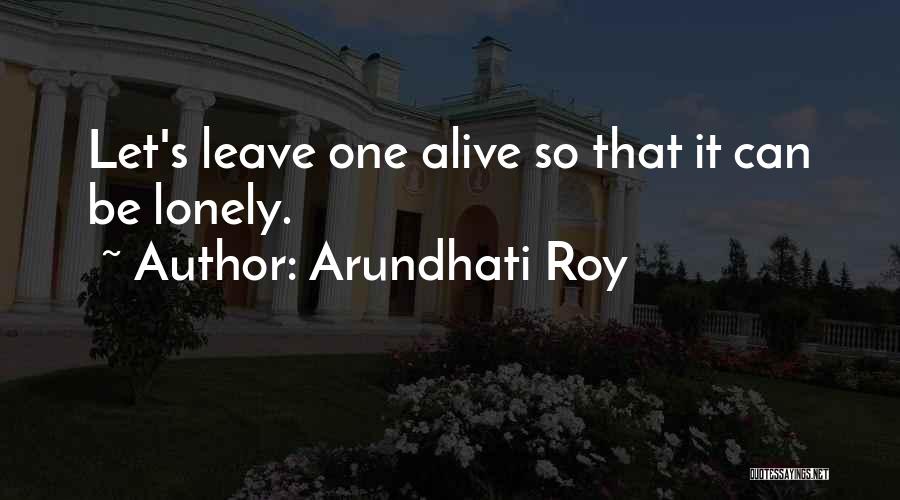
Let's leave one alive so that it can be lonely. — Arundhati Roy
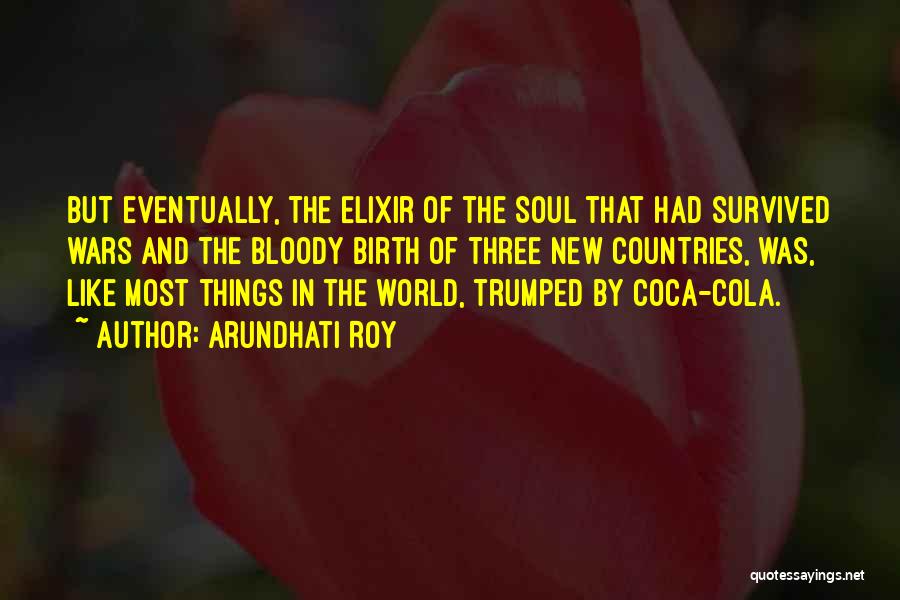
But eventually, the Elixir of the Soul that had survived wars and the bloody birth of three new countries, was, like most things in the world, trumped by Coca-Cola. — Arundhati Roy

Socrates asked the key question:
why should we be moral? — Arundhati Roy
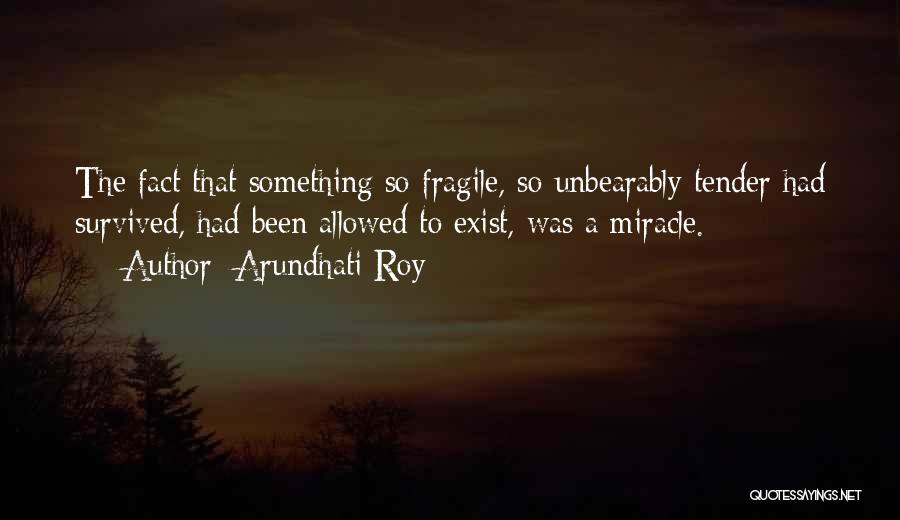
The fact that something so fragile, so unbearably tender had survived, had been allowed to exist, was a miracle. — Arundhati Roy
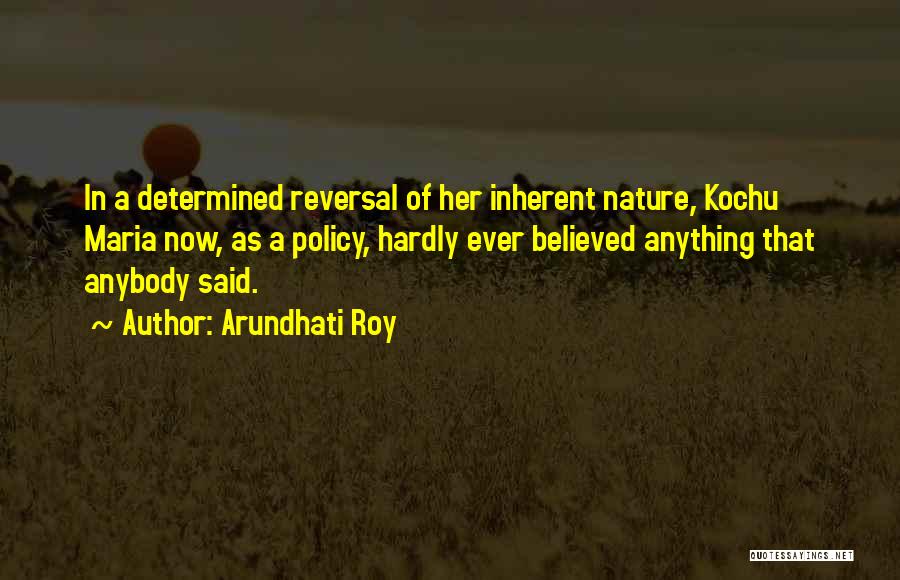
In a determined reversal of her inherent nature, Kochu Maria now, as a policy, hardly ever believed anything that anybody said. — Arundhati Roy

Her collarbones like wings that spread from the base of her throat to the ends of her shoulders. A bird held down by skin — Arundhati Roy
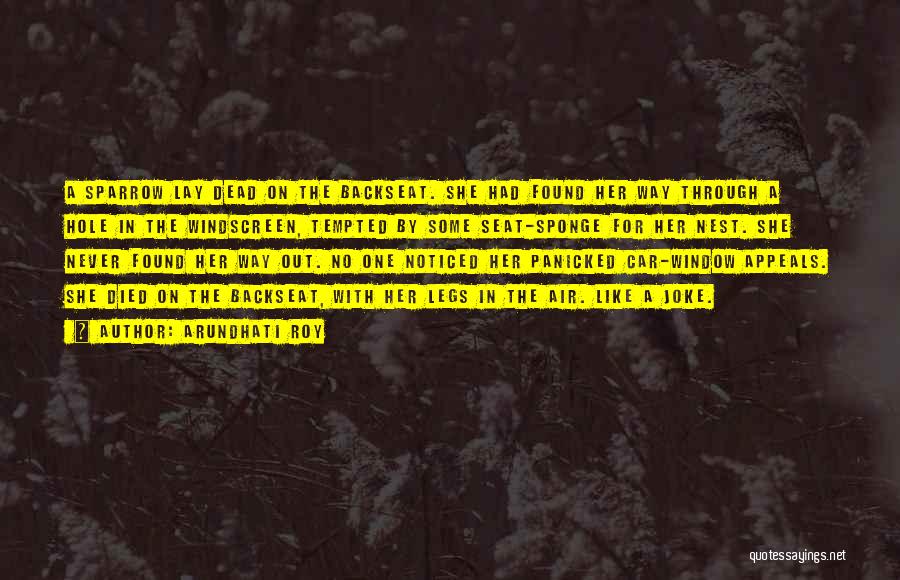
A sparrow lay dead on the backseat. She had found her way through a hole in the windscreen, tempted by some seat-sponge for her nest. She never found her way out. No one noticed her panicked car-window appeals. She died on the backseat, with her legs in the air. Like a joke. — Arundhati Roy
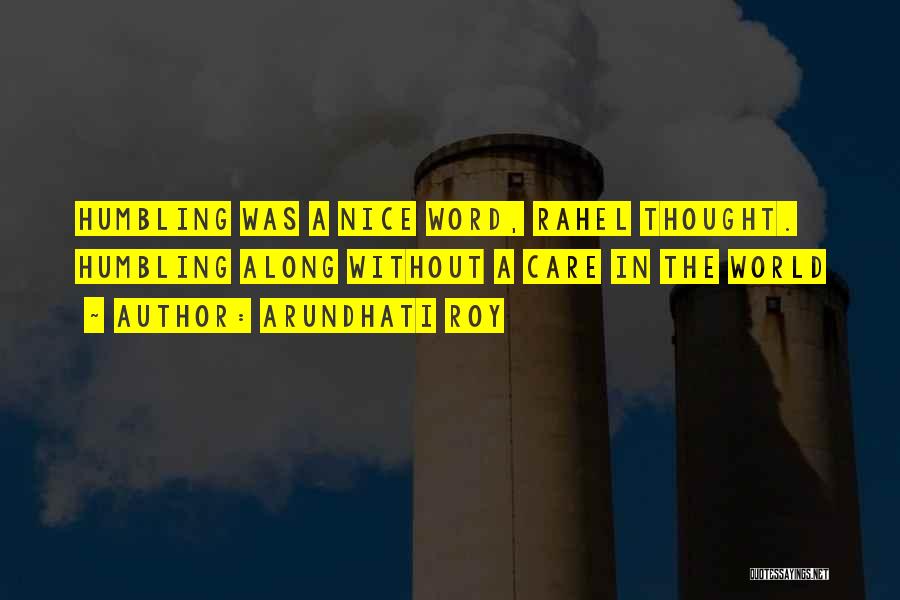
Humbling was a nice word, Rahel thought. Humbling along without a care in the world — Arundhati Roy
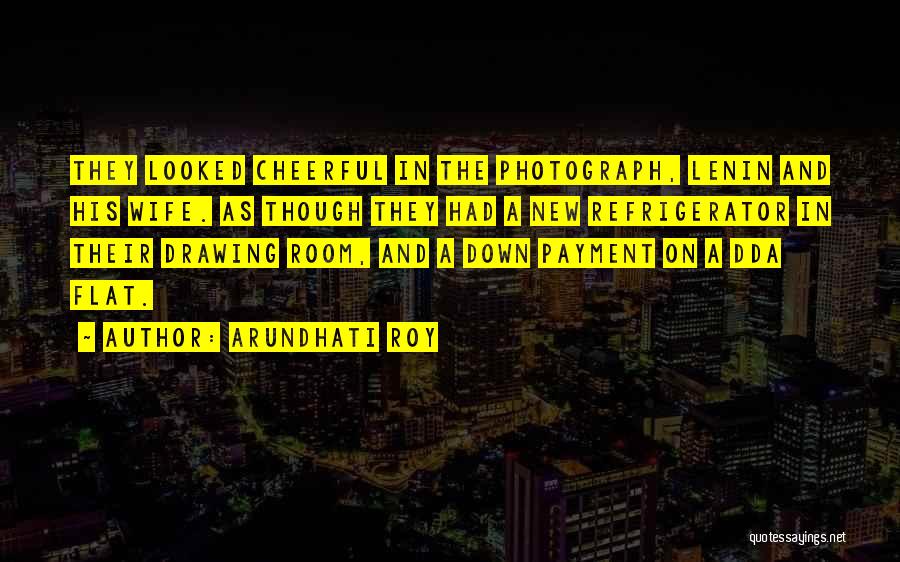
They looked cheerful in the photograph, Lenin and his wife. As though they had a new refrigerator in their drawing room, and a down payment on a DDA flat. — Arundhati Roy
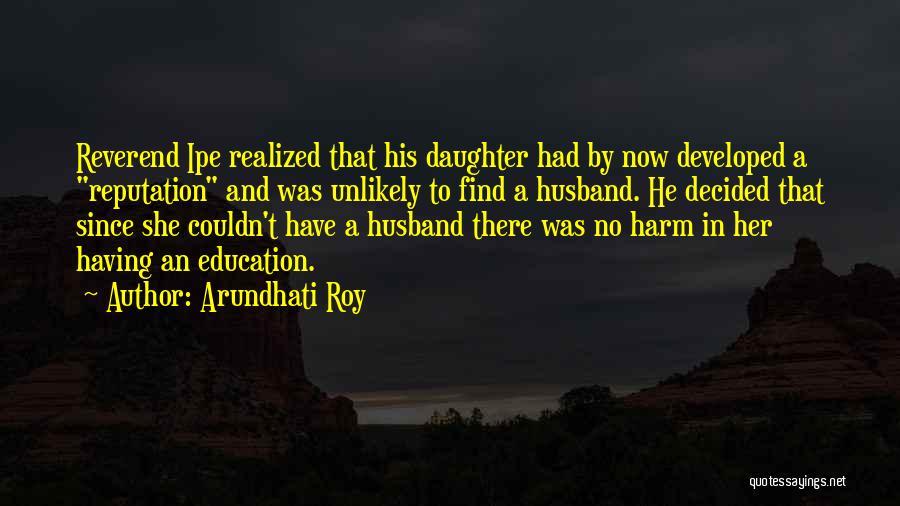
Reverend Ipe realized that his daughter had by now developed a "reputation" and was unlikely to find a husband. He decided that since she couldn't have a husband there was no harm in her having an education. — Arundhati Roy
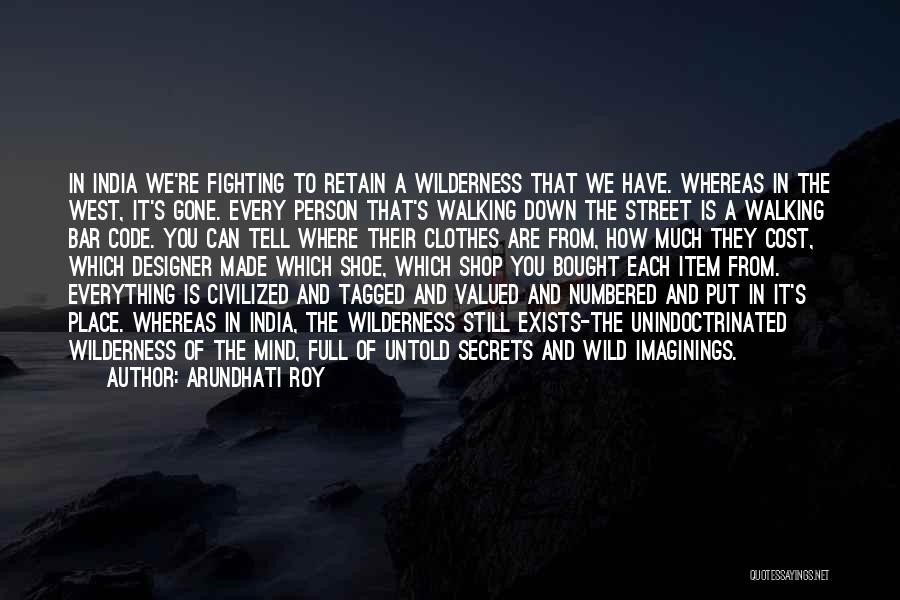
In India we're fighting to retain a wilderness that we have. Whereas in the west, it's gone. Every person that's walking down the street is a walking bar code. You can tell where their clothes are from, how much they cost, which designer made which shoe, which shop you bought each item from. Everything is civilized and tagged and valued and numbered and put in it's place. Whereas in India, the wilderness still exists-the unindoctrinated wilderness of the mind, full of untold secrets and wild imaginings. — Arundhati Roy
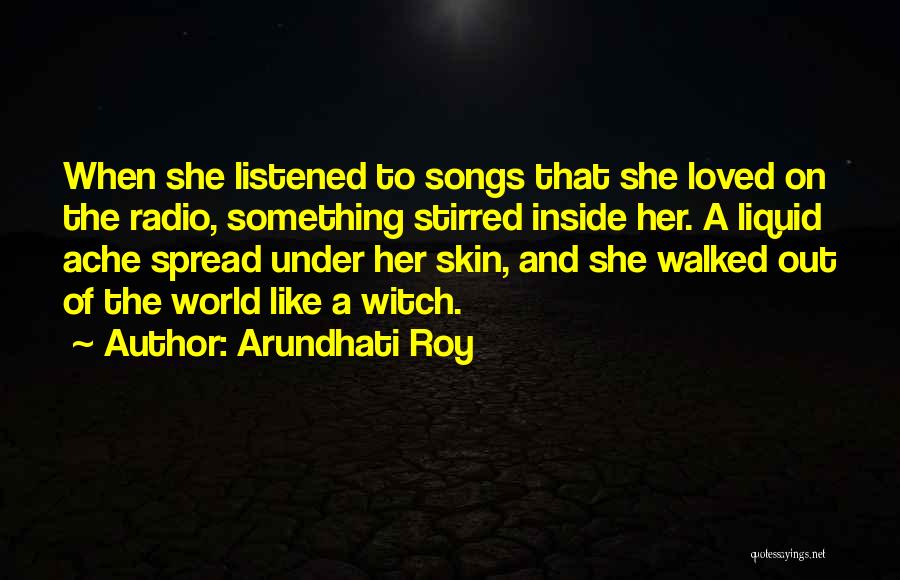
When she listened to songs that she loved on the radio, something stirred inside her. A liquid ache spread under her skin, and she walked out of the world like a witch. — Arundhati Roy
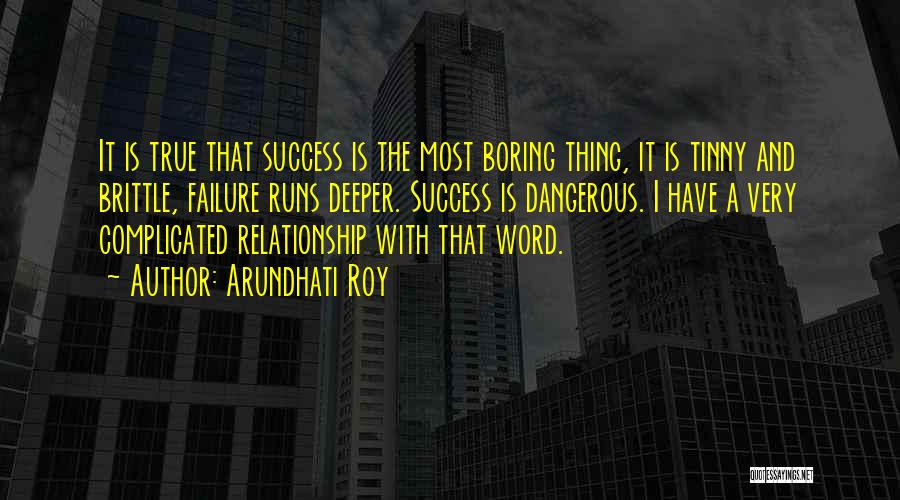
It is true that success is the most boring thing, it is tinny and brittle, failure runs deeper. Success is dangerous. I have a very complicated relationship with that word. — Arundhati Roy
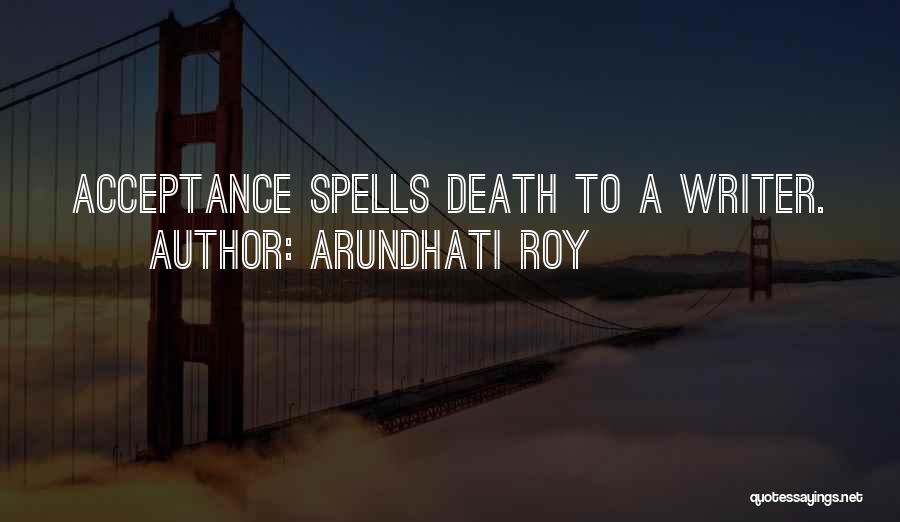
Acceptance spells death to a writer. — Arundhati Roy
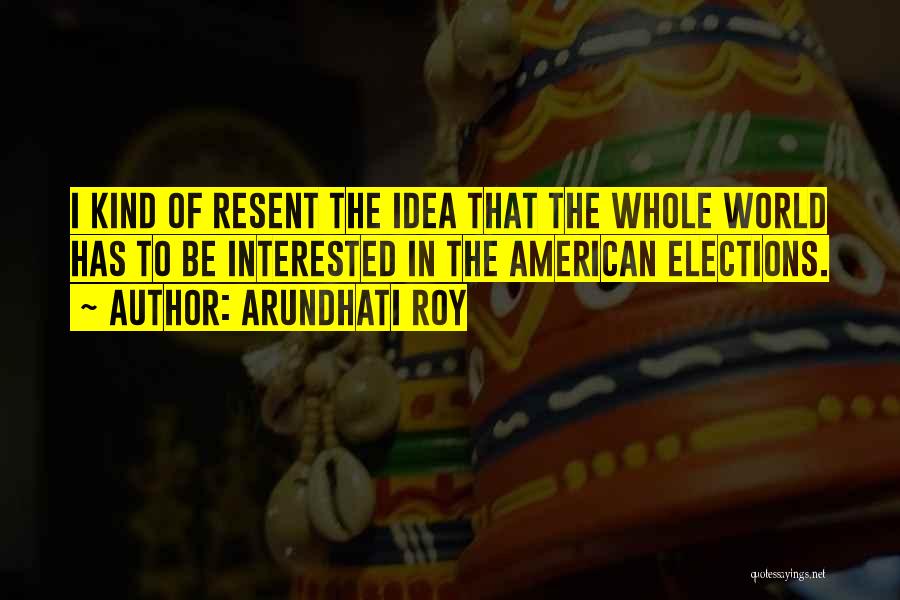
I kind of resent the idea that the whole world has to be interested in the American elections. — Arundhati Roy
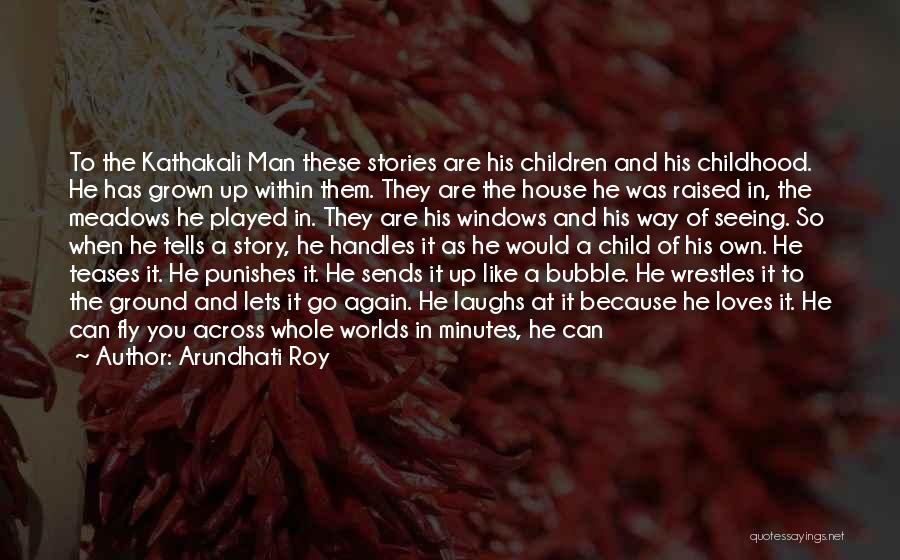
To the Kathakali Man these stories are his children and his childhood. He has grown up within them. They are the house he was raised in, the meadows he played in. They are his windows and his way of seeing. So when he tells a story, he handles it as he would a child of his own. He teases it. He punishes it. He sends it up like a bubble. He wrestles it to the ground and lets it go again. He laughs at it because he loves it. He can fly you across whole worlds in minutes, he can stop for hours to examine a wilting leaf. Or play with a sleeping monkey's tail. He can turn effortlessly from the carnage of war into the felicity of a woman washing her hair in a mountain stream. From the crafty ebullience of a rakshasa with a new idea into a gossipy Malayali with a scandal to spread. From the sensuousness of a woman with a baby at her breast into the seductive mischief of Krishna's smile. He can reveal the nugget of sorrow that happiness contains. The hidden fish of shame in a sea of glory. — Arundhati Roy
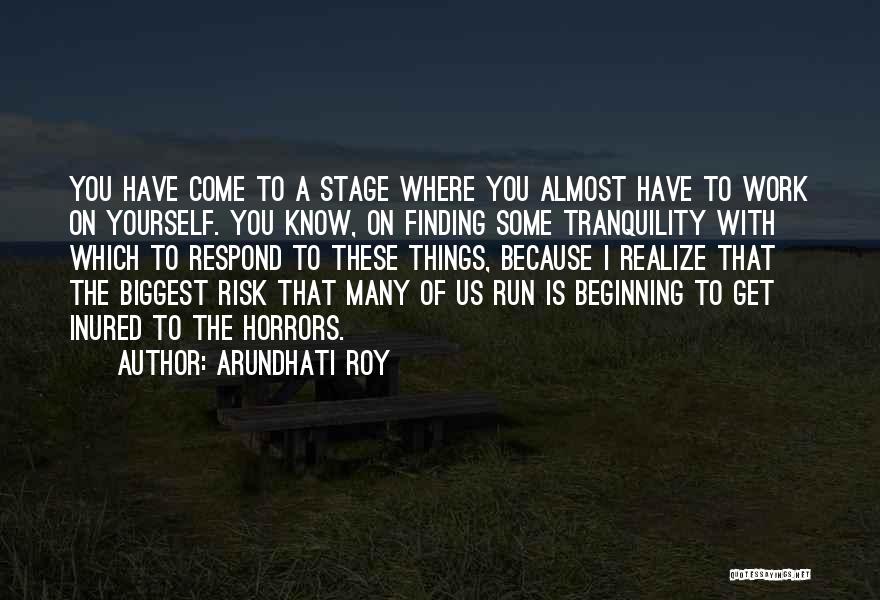
You have come to a stage where you almost have to work on yourself. You know, on finding some tranquility with which to respond to these things, because I realize that the biggest risk that many of us run is beginning to get inured to the horrors. — Arundhati Roy
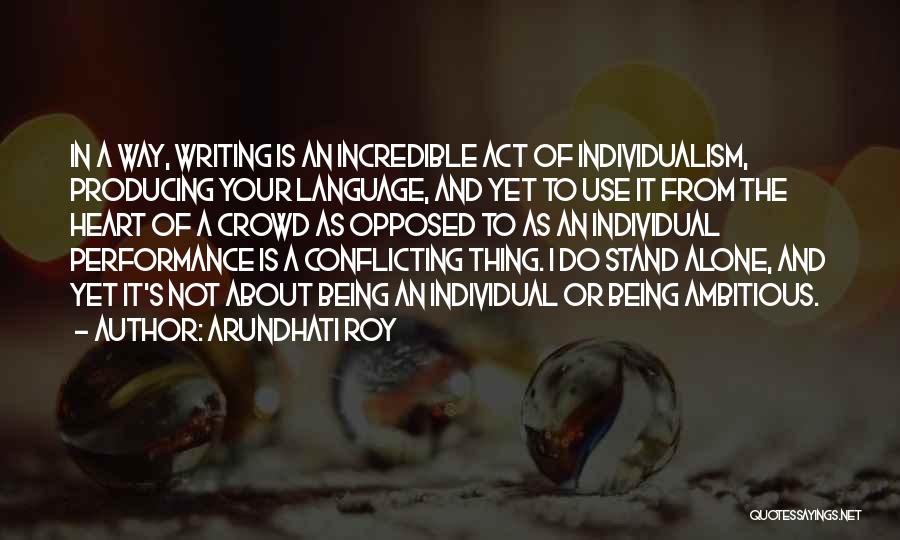
In a way, writing is an incredible act of individualism, producing your language, and yet to use it from the heart of a crowd as opposed to as an individual performance is a conflicting thing. I do stand alone, and yet it's not about being an individual or being ambitious. — Arundhati Roy
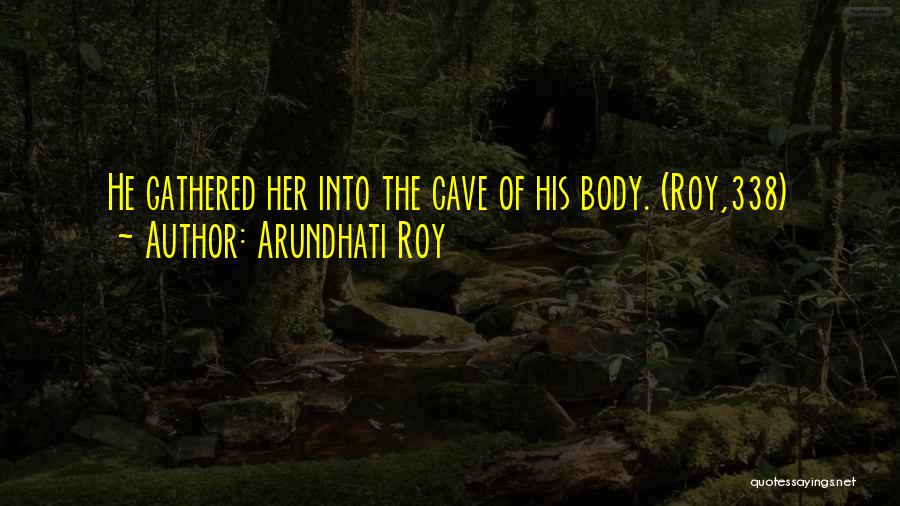
He gathered her into the cave of his body. (Roy,338) — Arundhati Roy
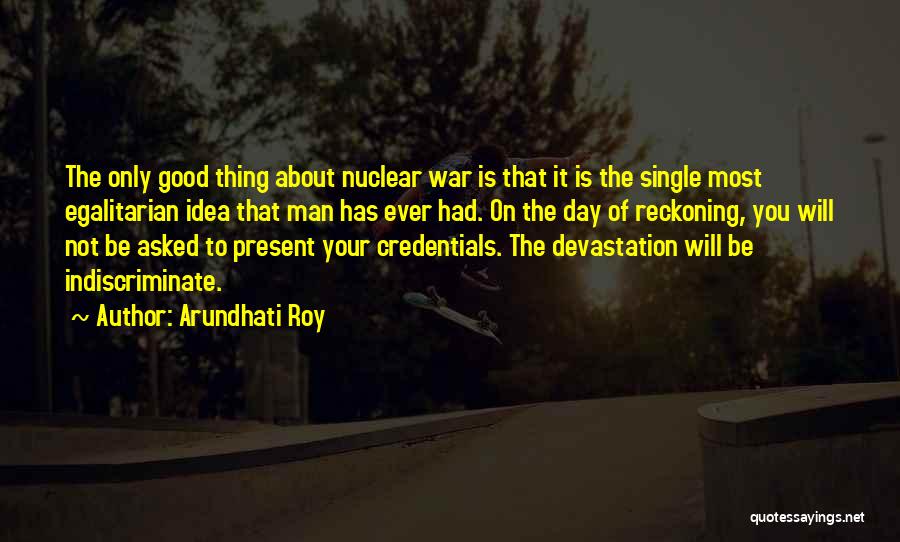
The only good thing about nuclear war is that it is the single most egalitarian idea that man has ever had. On the day of reckoning, you will not be asked to present your credentials. The devastation will be indiscriminate. — Arundhati Roy
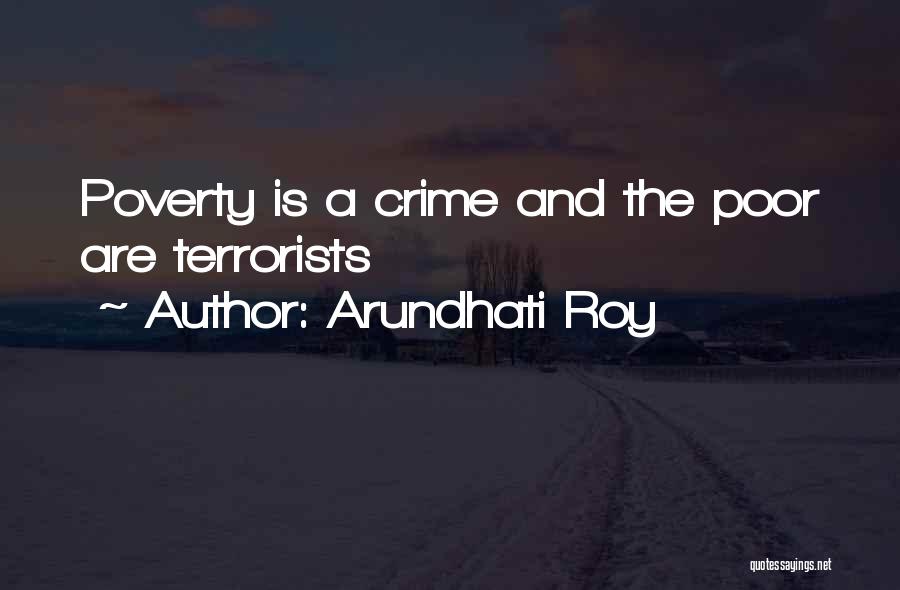
Poverty is a crime and the poor are terrorists — Arundhati Roy
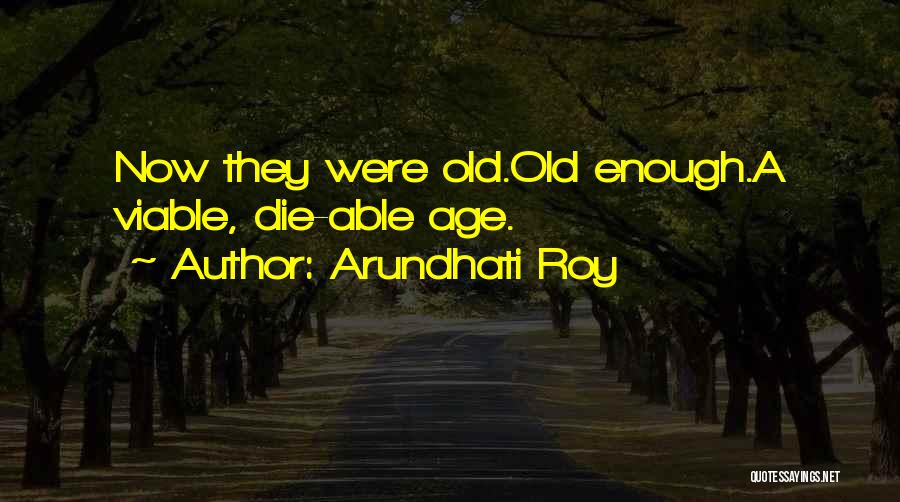
Now they were old.
Old enough.
A viable, die-able age. — Arundhati Roy
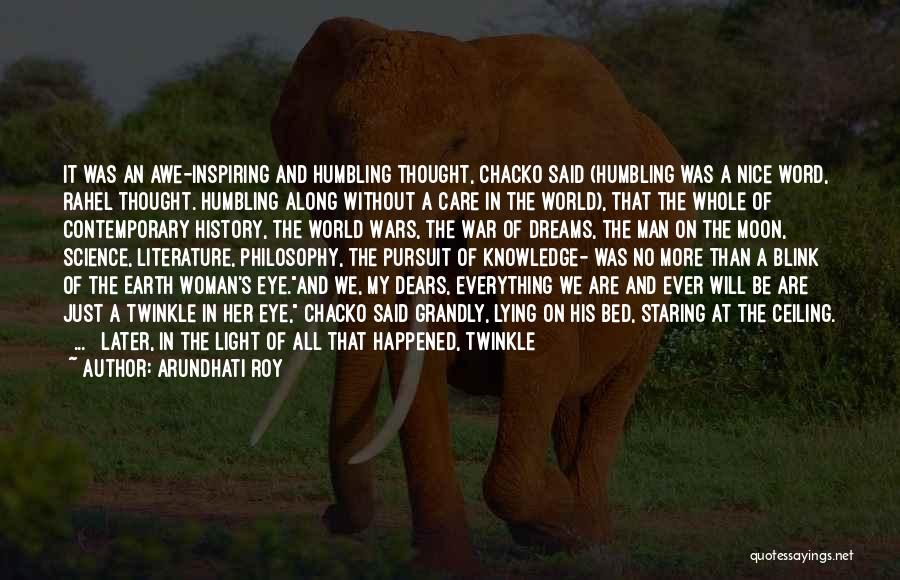
It was an awe-inspiring and humbling thought, Chacko said (Humbling was a nice word, Rahel thought. Humbling along without a care in the world), that the whole of contemporary history, the World Wars, the War of Dreams, the Man on the Moon, science, literature, philosophy, the pursuit of knowledge- was no more than a blink of the Earth Woman's eye.
"And we, my dears, everything we are and ever will be are just a twinkle in her eye," Chacko said grandly, lying on his bed, staring at the ceiling. [ ... ] Later, in the light of all that happened, twinkle seemed completely the wrong word to describe the expression in the Earth Woman's eye. Twinkle was a word with crinkled, happy edges. — Arundhati Roy
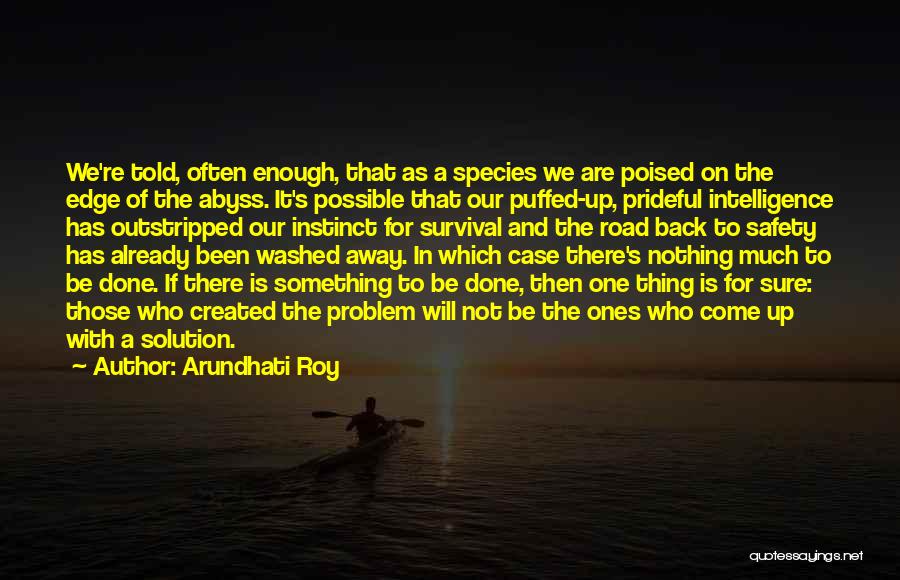
We're told, often enough, that as a species we are poised on the edge of the abyss. It's possible that our puffed-up, prideful intelligence has outstripped our instinct for survival and the road back to safety has already been washed away. In which case there's nothing much to be done. If there is something to be done, then one thing is for sure: those who created the problem will not be the ones who come up with a solution. — Arundhati Roy
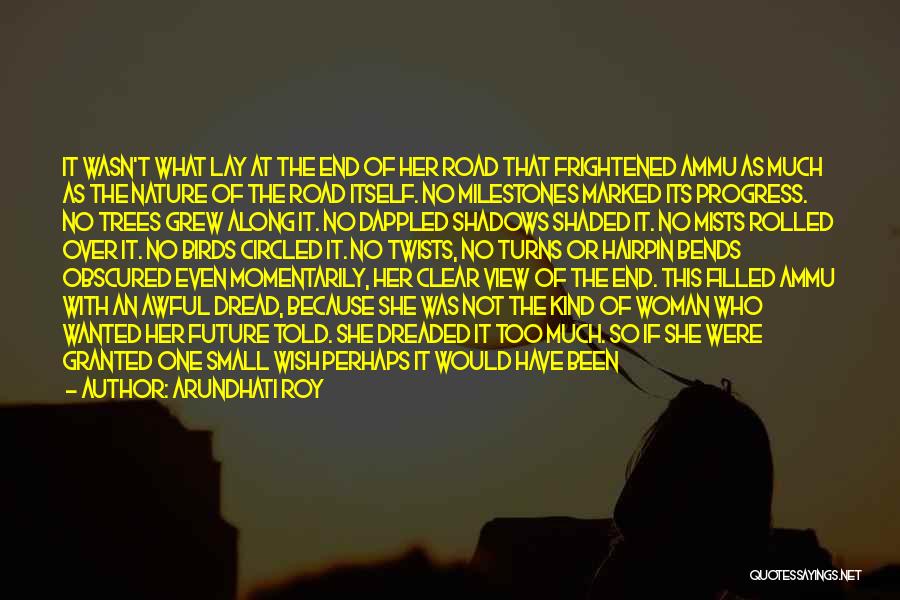
It wasn't what lay at the end of her road that frightened Ammu as much as the nature of the road itself. No milestones marked its progress. No trees grew along it. No dappled shadows shaded it. No mists rolled over it. No birds circled it. No twists, no turns or hairpin bends obscured even momentarily, her clear view of the end. This filled Ammu with an awful dread, because she was not the kind of woman who wanted her future told. She dreaded it too much. So if she were granted one small wish perhaps it would have been Not to Know, Not to know what each day hed in store for her. Not to know where she might be, next month, next year. Ten years on. Not to know which way her road might turn and what lay beyond the bend. — Arundhati Roy
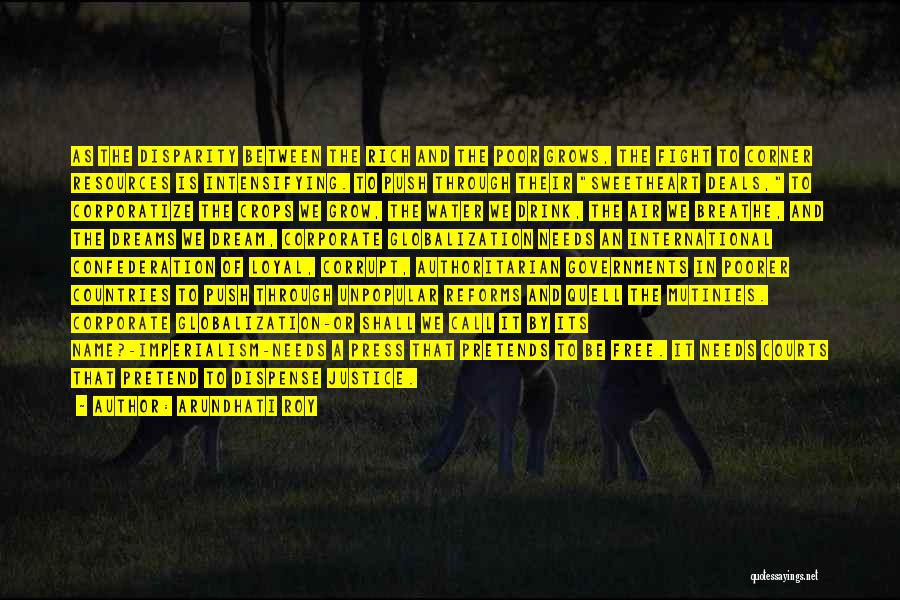
As the disparity between the rich and the poor grows, the fight to corner resources is intensifying. To push through their "sweetheart deals," to corporatize the crops we grow, the water we drink, the air we breathe, and the dreams we dream, corporate globalization needs an international confederation of loyal, corrupt, authoritarian governments in poorer countries to push through unpopular reforms and quell the mutinies. Corporate Globalization-or shall we call it by its name?-Imperialism-needs a press that pretends to be free. It needs courts that pretend to dispense justice. — Arundhati Roy
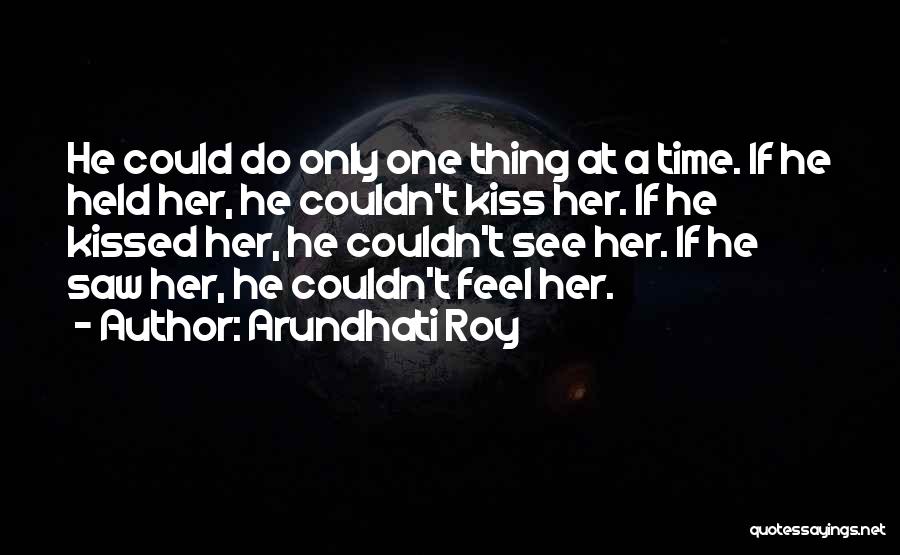
He could do only one thing at a time. If he held her, he couldn't kiss her. If he kissed her, he couldn't see her. If he saw her, he couldn't feel her. — Arundhati Roy
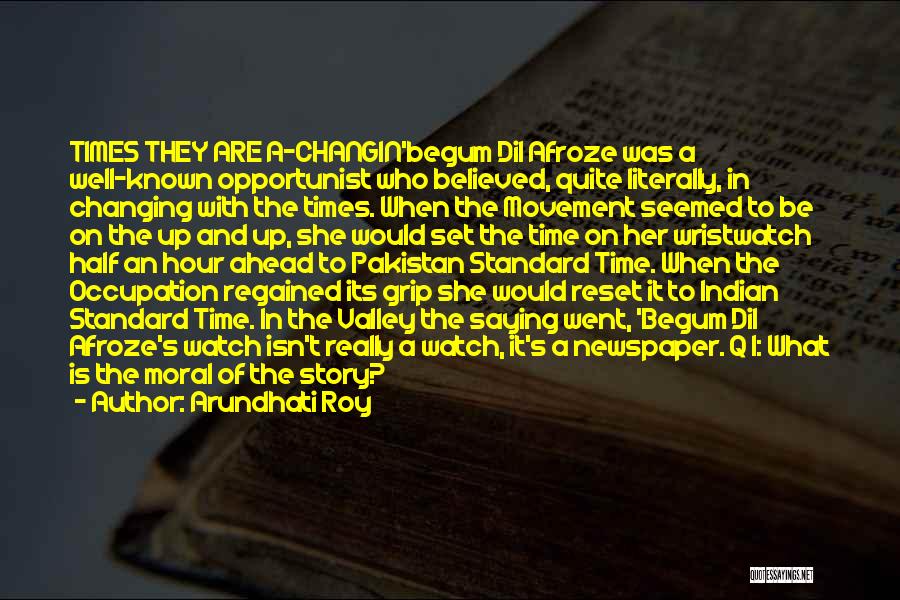
TIMES THEY ARE A-CHANGIN'
begum Dil Afroze was a well-known opportunist who believed, quite literally, in changing with the times. When the Movement seemed to be on the up and up, she would set the time on her wristwatch half an hour ahead to Pakistan Standard Time. When the Occupation regained its grip she would reset it to Indian Standard Time. In the Valley the saying went, 'Begum Dil Afroze's watch isn't really a watch, it's a newspaper.
Q 1: What is the moral of the story? — Arundhati Roy
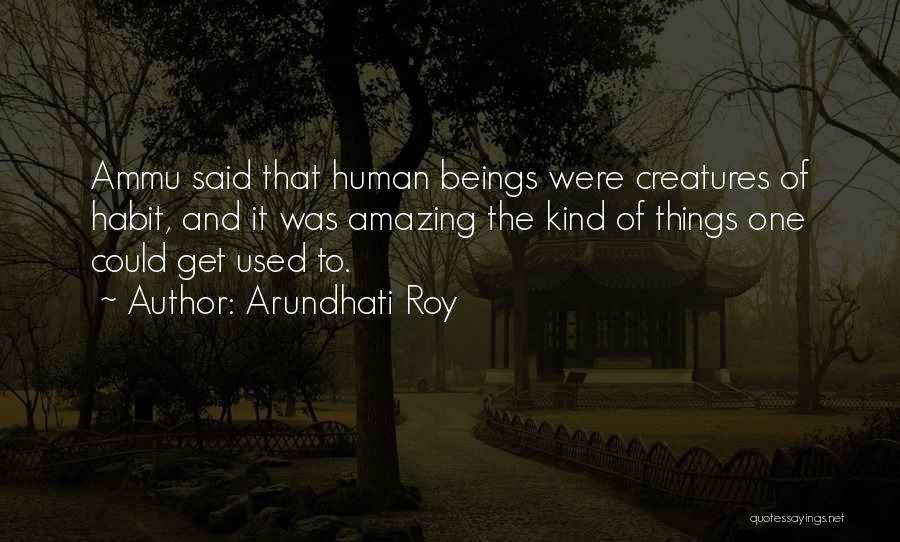
Ammu said that human beings were creatures of habit, and it was amazing the kind of things one could get used to. — Arundhati Roy
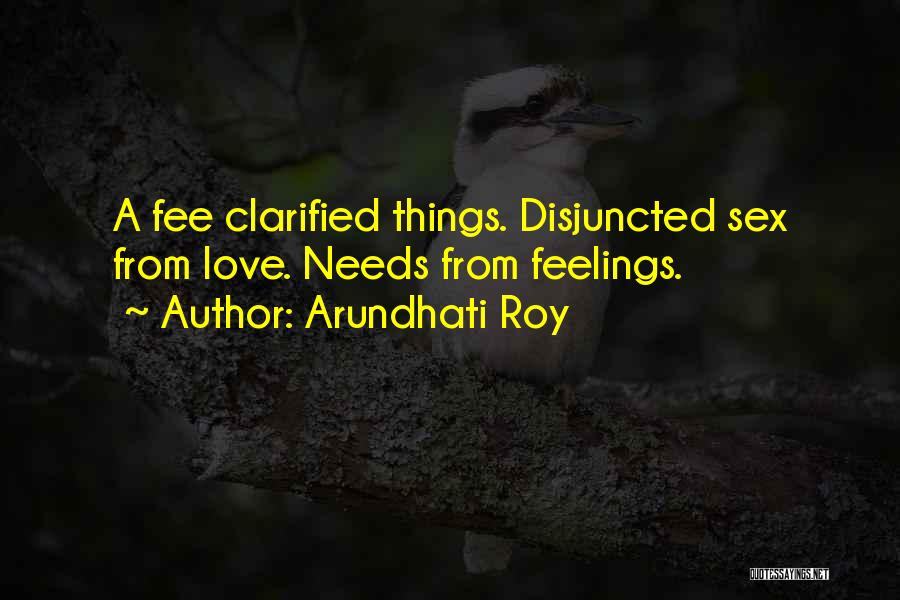
A fee clarified things. Disjuncted sex from love. Needs from feelings. — Arundhati Roy
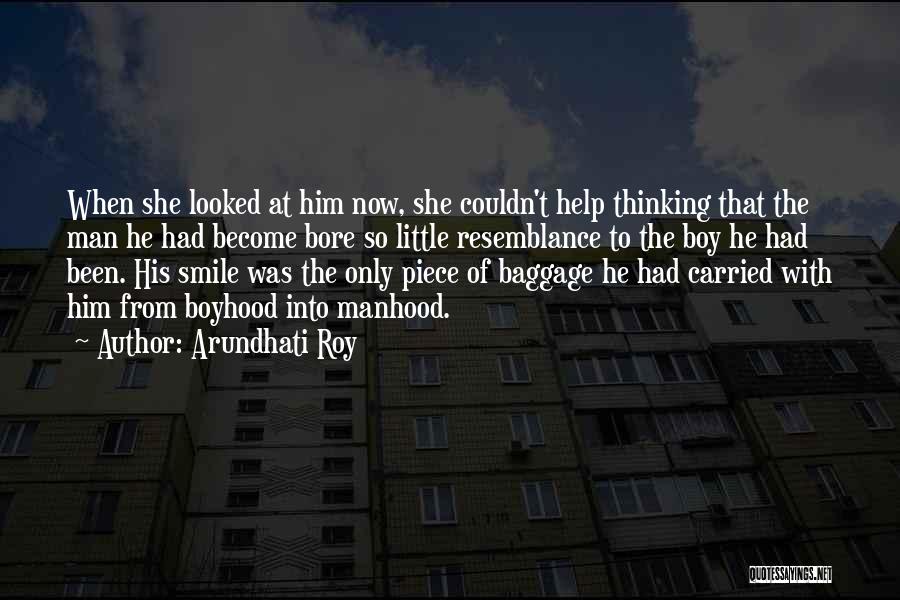
When she looked at him now, she couldn't help thinking that the man he had become bore so little resemblance to the boy he had been. His smile was the only piece of baggage he had carried with him from boyhood into manhood. — Arundhati Roy
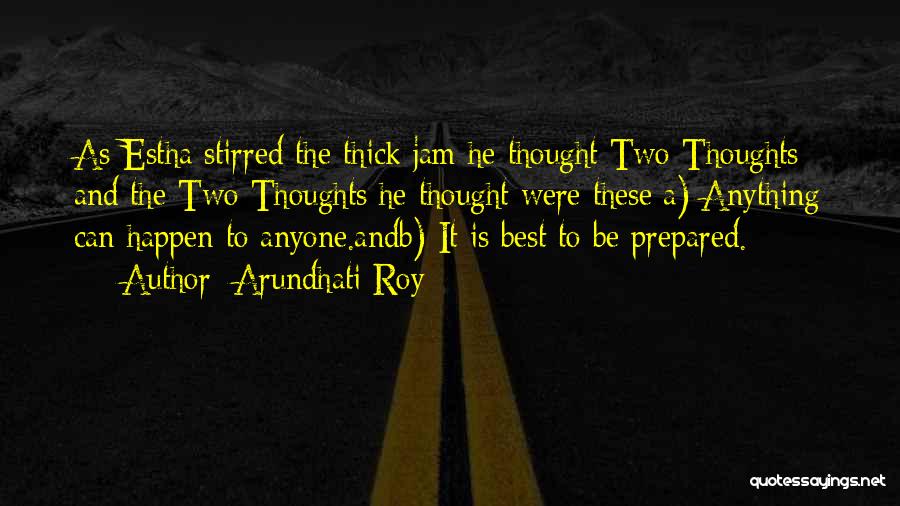
As Estha stirred the thick jam he thought Two Thoughts and the Two Thoughts he thought were these:
a) Anything can happen to anyone.
and
b) It is best to be prepared. — Arundhati Roy
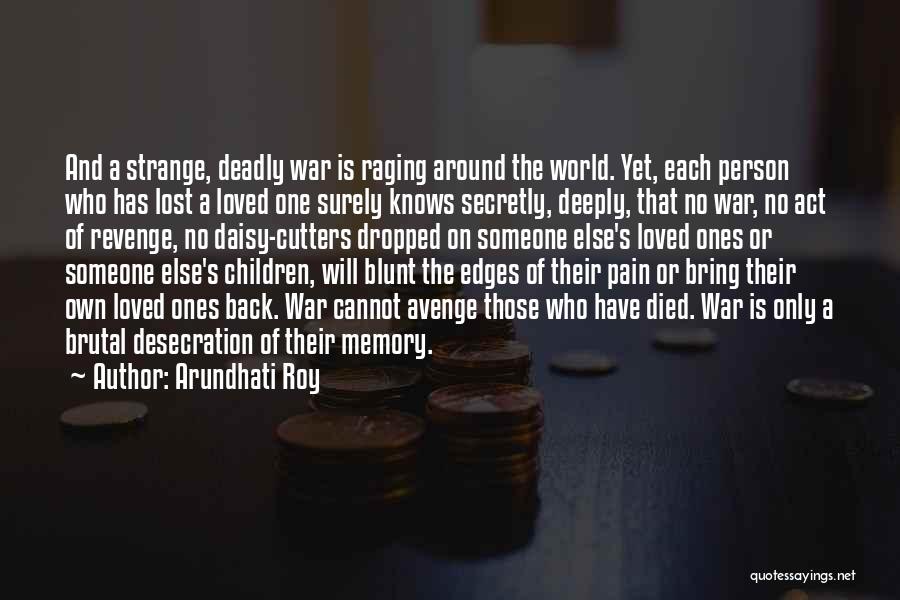
And a strange, deadly war is raging around the world. Yet, each person who has lost a loved one surely knows secretly, deeply, that no war, no act of revenge, no daisy-cutters dropped on someone else's loved ones or someone else's children, will blunt the edges of their pain or bring their own loved ones back. War cannot avenge those who have died. War is only a brutal desecration of their memory. — Arundhati Roy
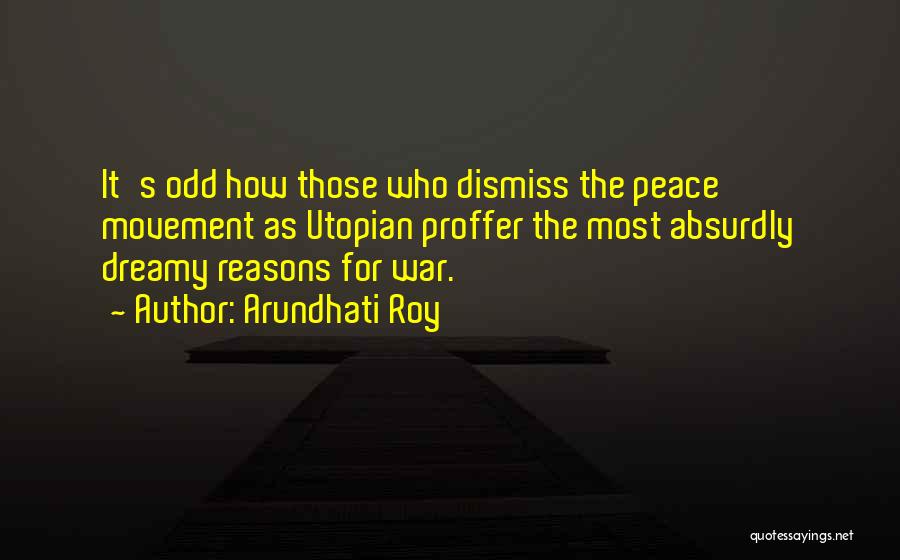
It's odd how those who dismiss the peace movement as Utopian proffer the most absurdly dreamy reasons for war. — Arundhati Roy
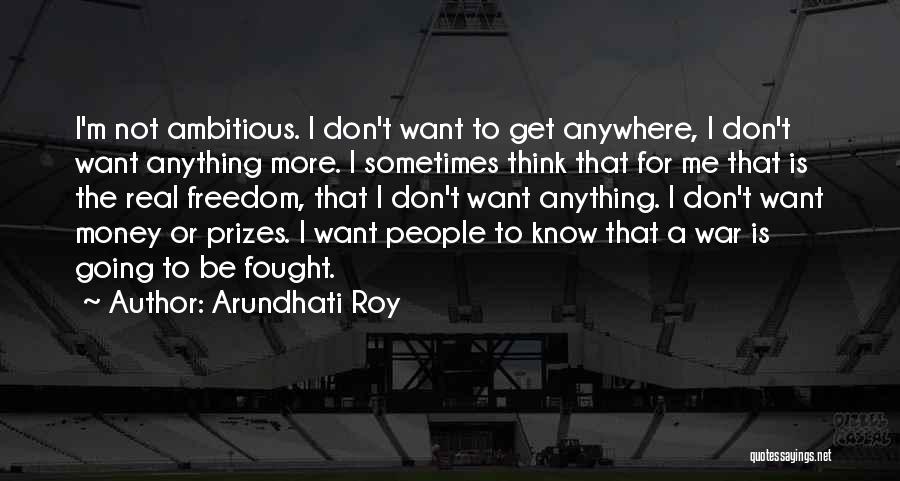
I'm not ambitious. I don't want to get anywhere, I don't want anything more. I sometimes think that for me that is the real freedom, that I don't want anything. I don't want money or prizes. I want people to know that a war is going to be fought. — Arundhati Roy
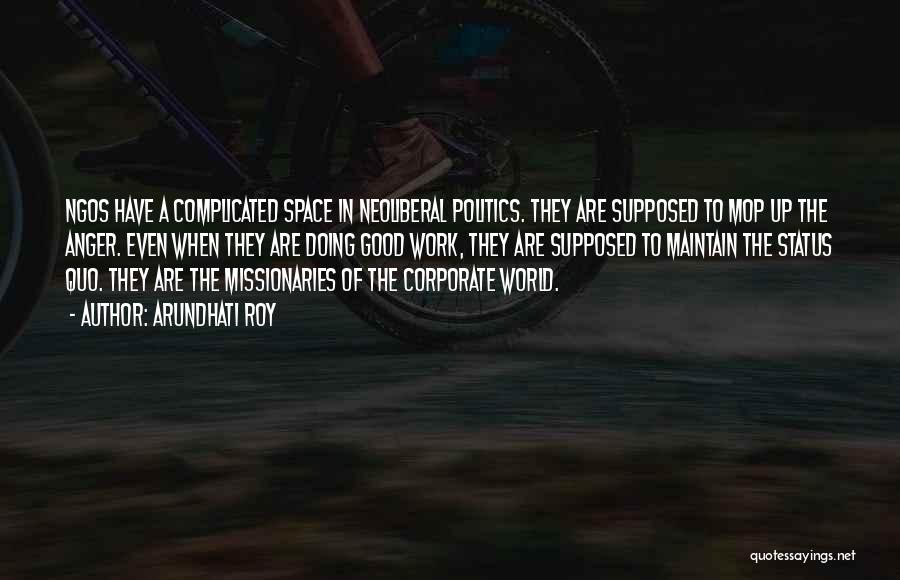
NGOs have a complicated space in neoliberal politics. They are supposed to mop up the anger. Even when they are doing good work, they are supposed to maintain the status quo. They are the missionaries of the corporate world. — Arundhati Roy
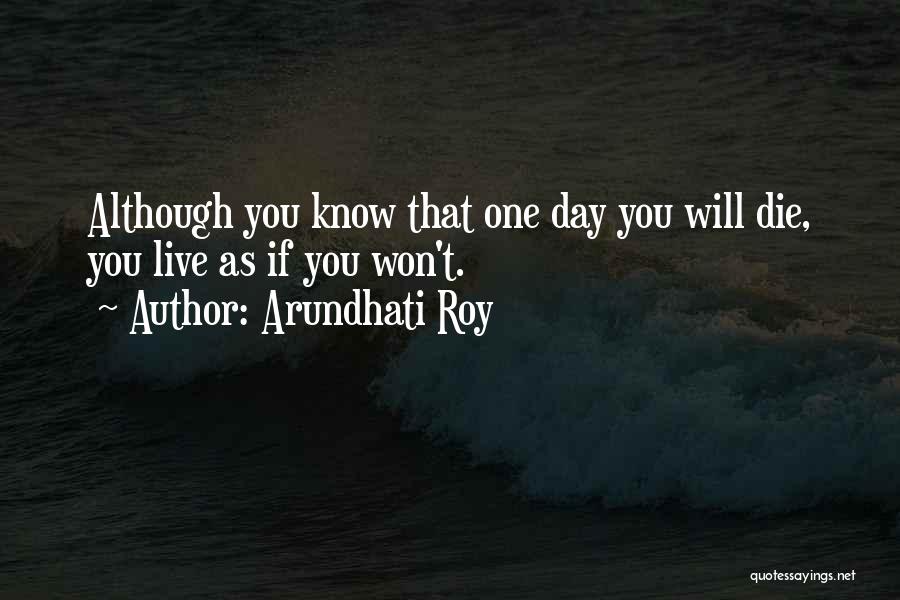
Although you know that one day you will die, you live as if you won't. — Arundhati Roy
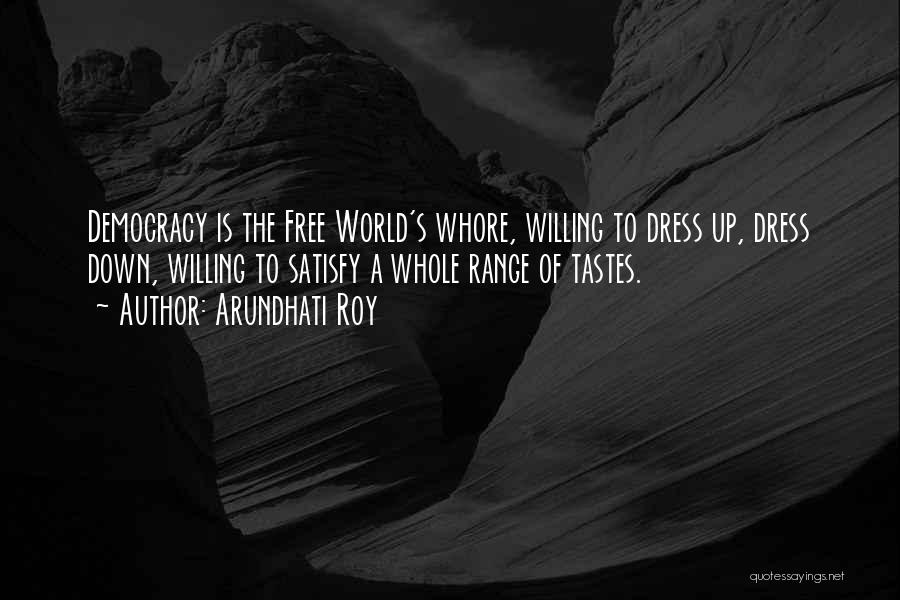
Democracy is the Free World's whore, willing to dress up, dress down, willing to satisfy a whole range of tastes. — Arundhati Roy
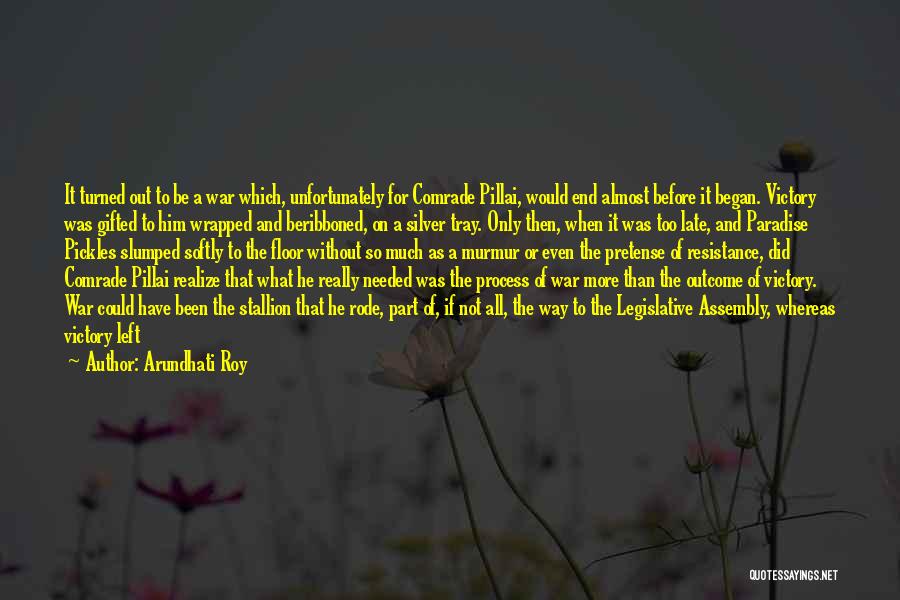
It turned out to be a war which, unfortunately for Comrade Pillai, would end almost before it began. Victory was gifted to him wrapped and beribboned, on a silver tray. Only then, when it was too late, and Paradise Pickles slumped softly to the floor without so much as a murmur or even the pretense of resistance, did Comrade Pillai realize that what he really needed was the process of war more than the outcome of victory. War could have been the stallion that he rode, part of, if not all, the way to the Legislative Assembly, whereas victory left him no better off than when he started out.
He broke the eggs but burned the omelette. — Arundhati Roy
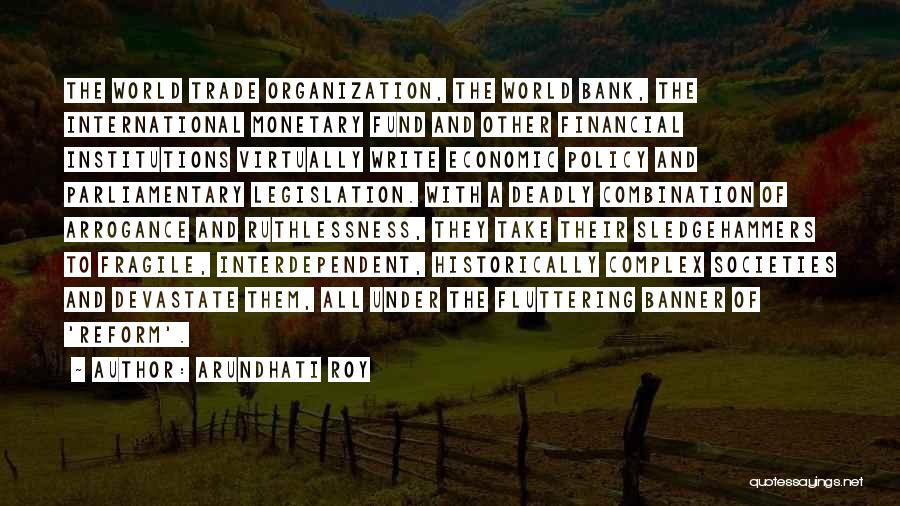
The World Trade Organization, The World Bank, The International Monetary Fund and other financial institutions virtually write economic policy and parliamentary legislation. With a deadly combination of arrogance and ruthlessness, they take their sledgehammers to fragile, interdependent, historically complex societies and devastate them, all under the fluttering banner of 'reform'. — Arundhati Roy
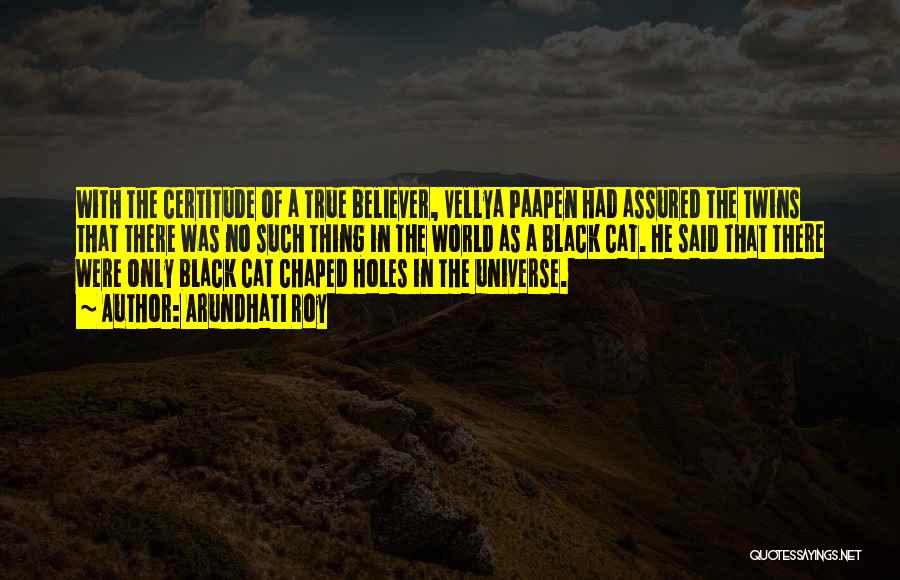
With the certitude of a true believer, Vellya Paapen had assured the twins that there was no such thing in the world as a black cat. He said that there were only black cat chaped holes in the universe. — Arundhati Roy
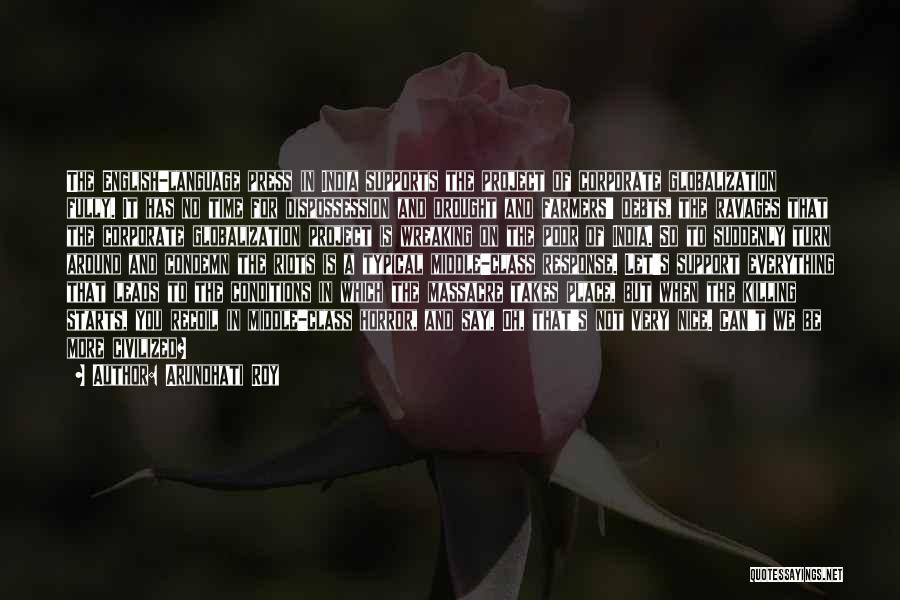
The English-language press in India supports the project of corporate globalization fully. It has no time for dispossession and drought and farmers' debts, the ravages that the corporate globalization project is wreaking on the poor of India. So to suddenly turn around and condemn the riots is a typical middle-class response. Let's support everything that leads to the conditions in which the massacre takes place, but when the killing starts, you recoil in middle-class horror, and say, Oh, that's not very nice. Can't we be more civilized? — Arundhati Roy
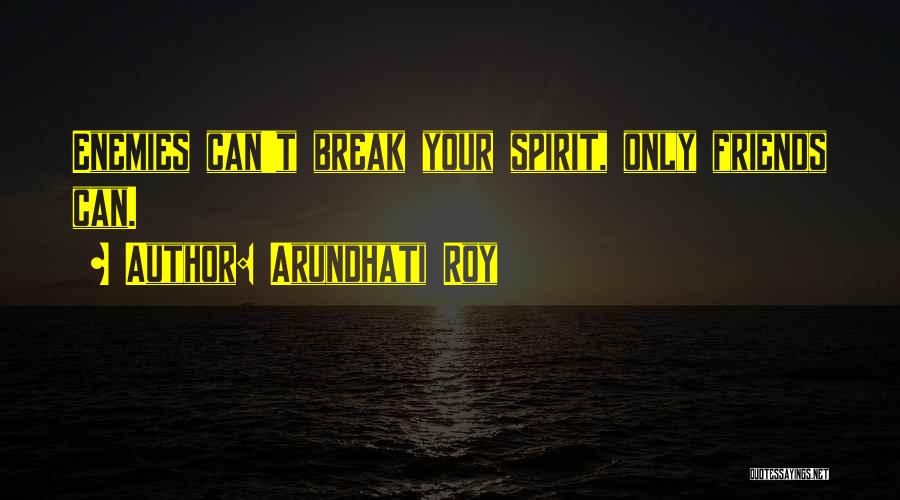
Enemies can't break your spirit, only friends can. — Arundhati Roy
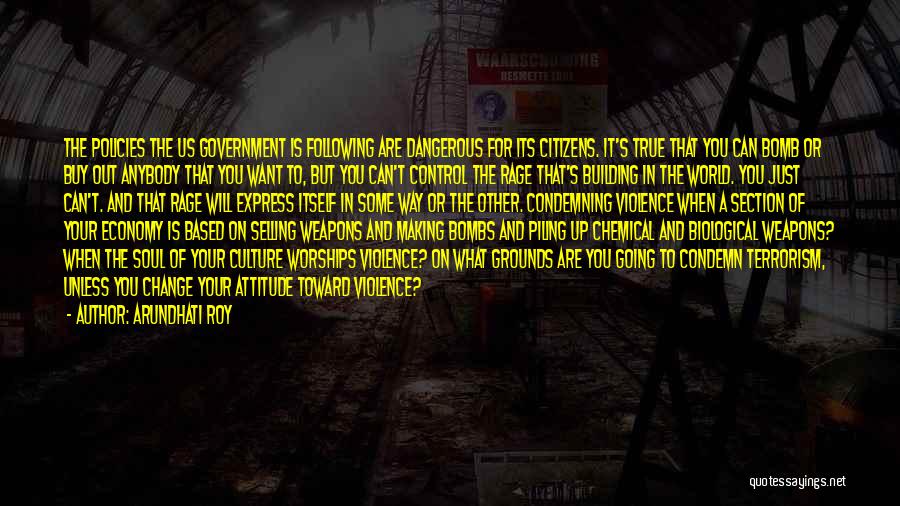
The policies the US government is following are dangerous for its citizens. It's true that you can bomb or buy out anybody that you want to, but you can't control the rage that's building in the world. You just can't. And that rage will express itself in some way or the other. Condemning violence when a section of your economy is based on selling weapons and making bombs and piling up chemical and biological weapons? When the soul of your culture worships violence? On what grounds are you going to condemn terrorism, unless you change your attitude toward violence? — Arundhati Roy
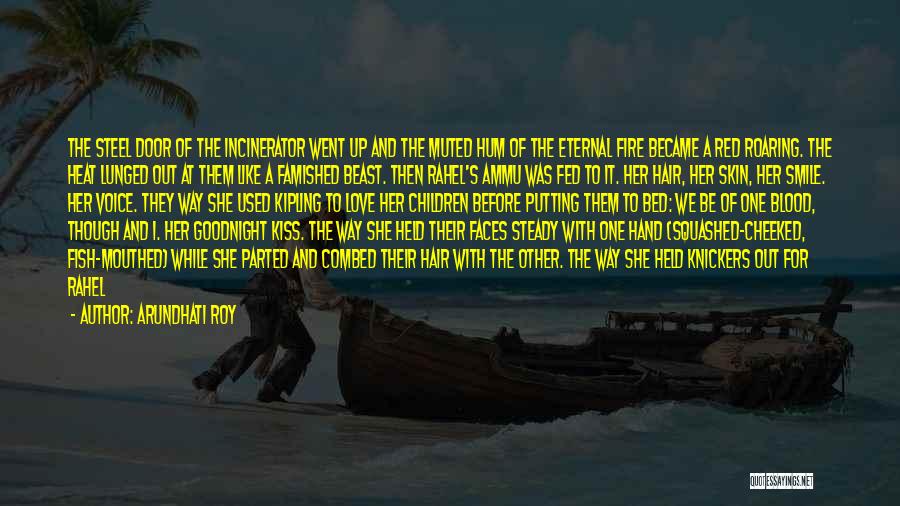
The steel door of the incinerator went up and the muted hum of the eternal fire became a red roaring. The heat lunged out at them like a famished beast. Then Rahel's Ammu was fed to it. Her hair, her skin, her smile. Her voice. They way she used Kipling to love her children before putting them to bed: We be of one blood, though and I. Her goodnight kiss. The way she held their faces steady with one hand (squashed-cheeked, fish-mouthed) while she parted and combed their hair with the other. The way she held knickers out for Rahel to climb into. Left leg, right leg. All this was fed to the beast, and it was satisfied.
She was their Ammu and their Baba and she had loved them Double. — Arundhati Roy
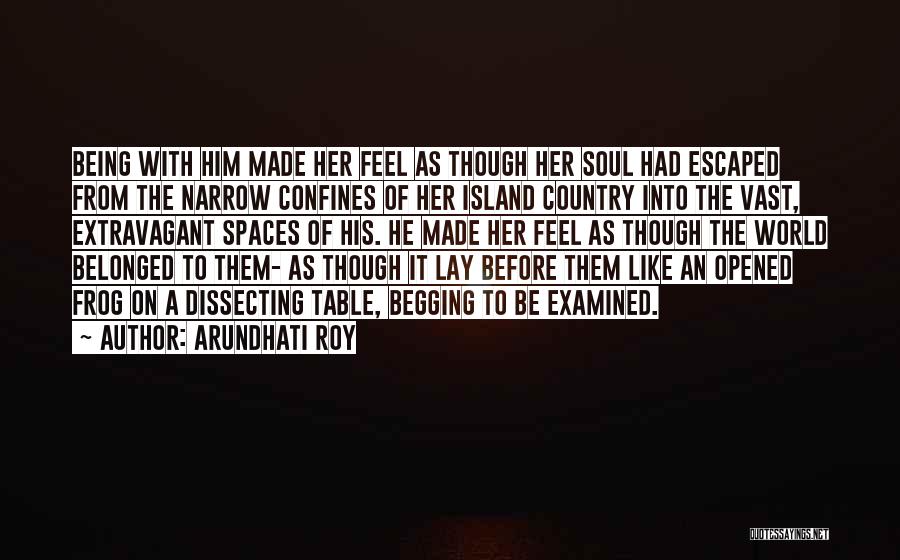
Being with him made her feel as though her soul had escaped from the narrow confines of her island country into the vast, extravagant spaces of his. He made her feel as though the world belonged to them- as though it lay before them like an opened frog on a dissecting table, begging to be examined. — Arundhati Roy
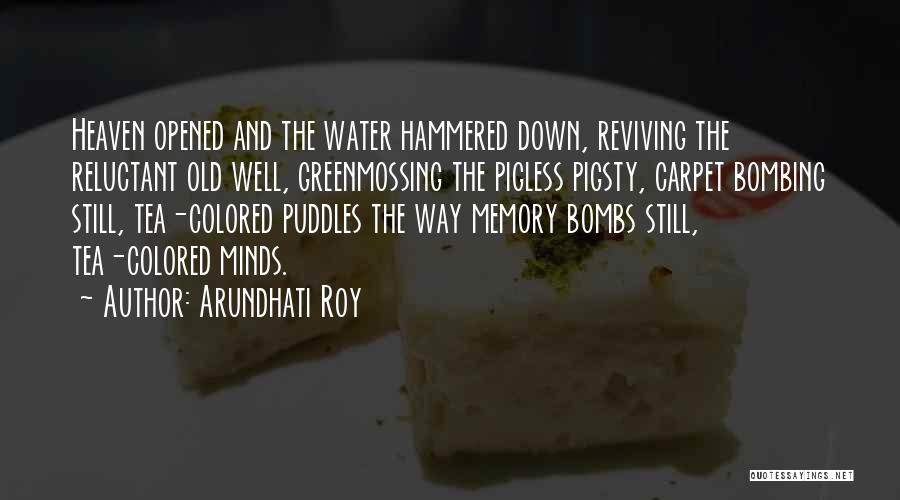
Heaven opened and the water hammered down, reviving the reluctant old well, greenmossing the pigless pigsty, carpet bombing still, tea-colored puddles the way memory bombs still, tea-colored minds. — Arundhati Roy
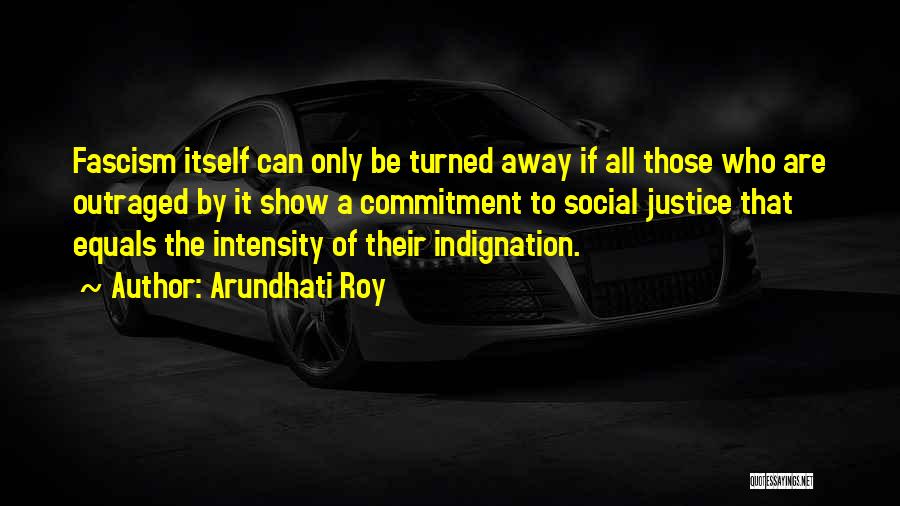
Fascism itself can only be turned away if all those who are outraged by it show a commitment to social justice that equals the intensity of their indignation. — Arundhati Roy
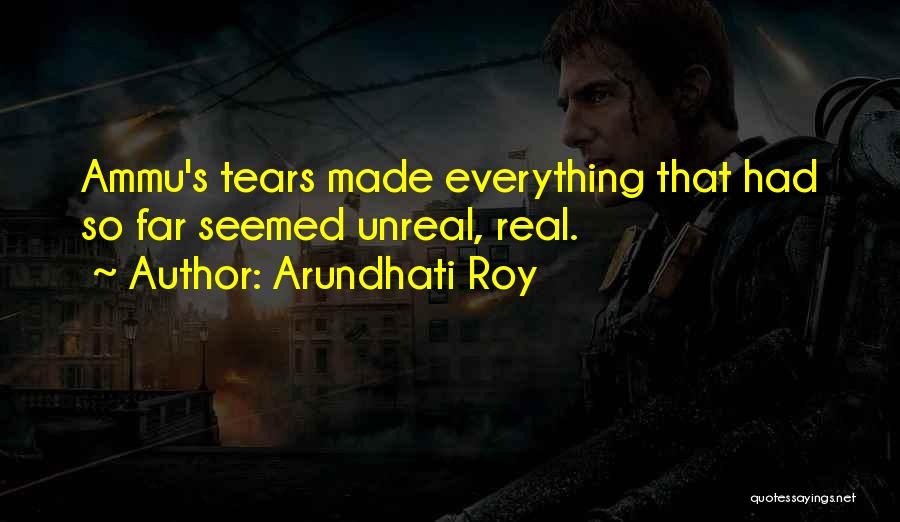
Ammu's tears made everything that had so far seemed unreal, real. — Arundhati Roy
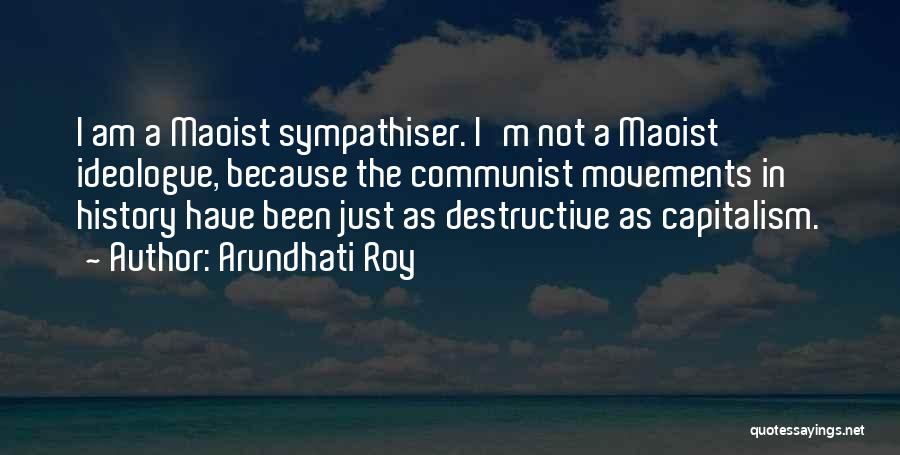
I am a Maoist sympathiser. I'm not a Maoist ideologue, because the communist movements in history have been just as destructive as capitalism. — Arundhati Roy
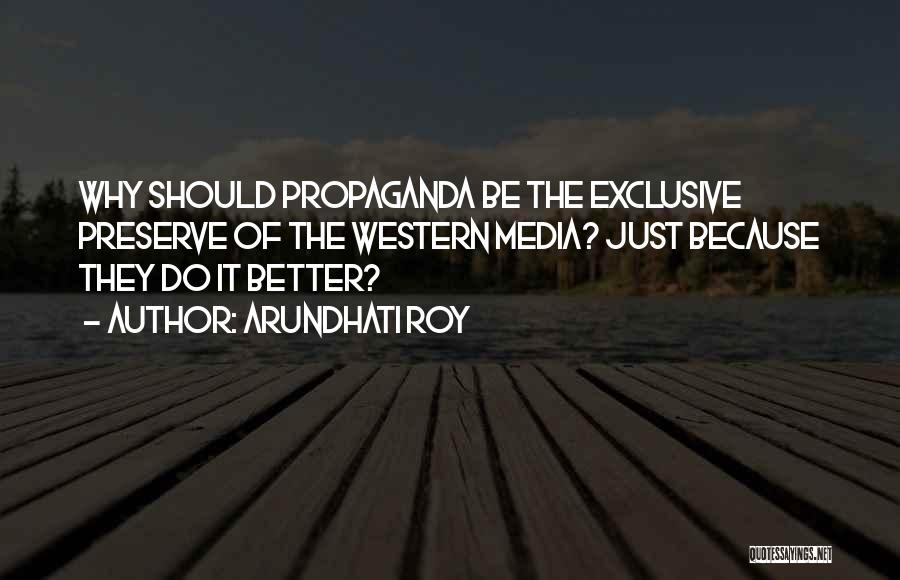
Why should propaganda be the exclusive preserve of the Western media? Just because they do it better? — Arundhati Roy
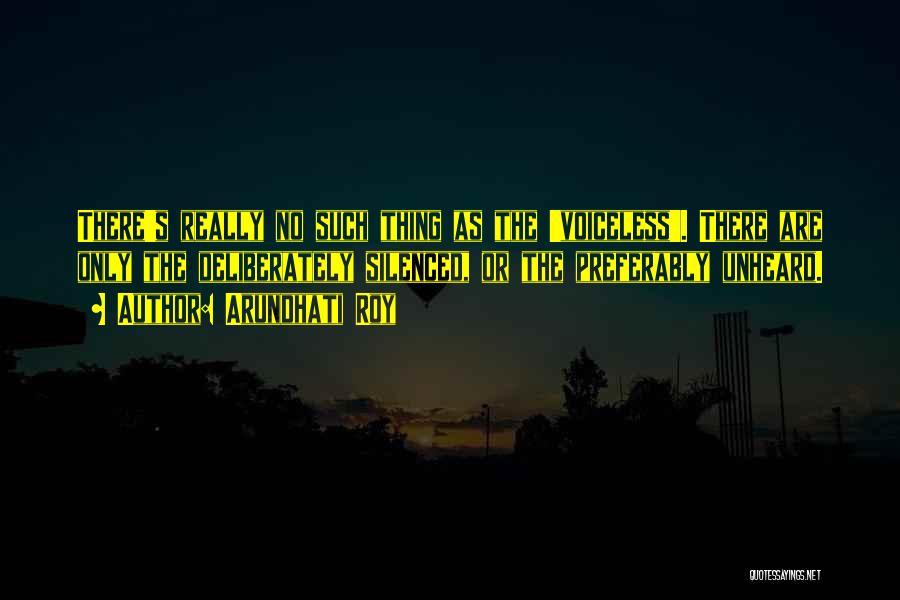
There's really no such thing as the 'voiceless'. There are only the deliberately silenced, or the preferably unheard. — Arundhati Roy
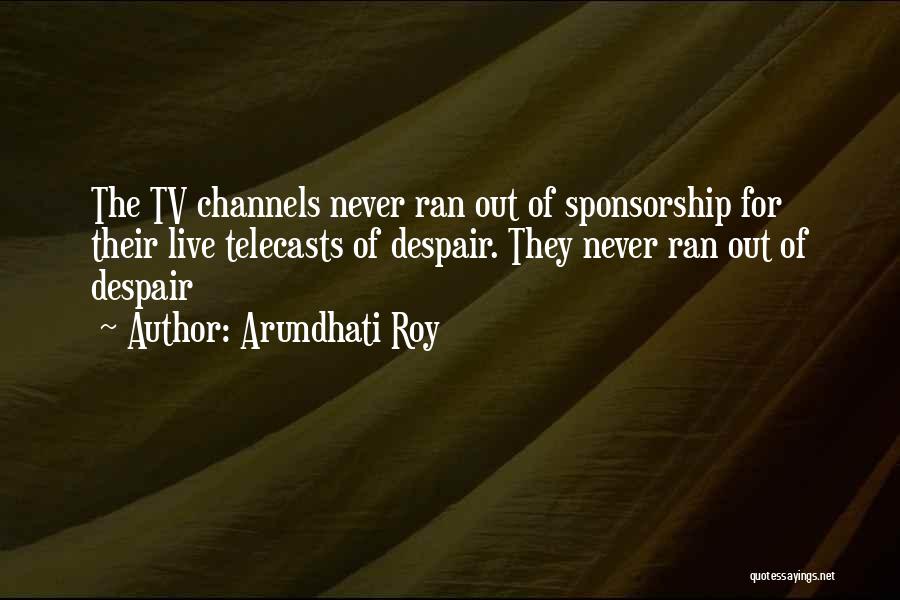
The TV channels never ran out of sponsorship for their live telecasts of despair. They never ran out of despair — Arundhati Roy
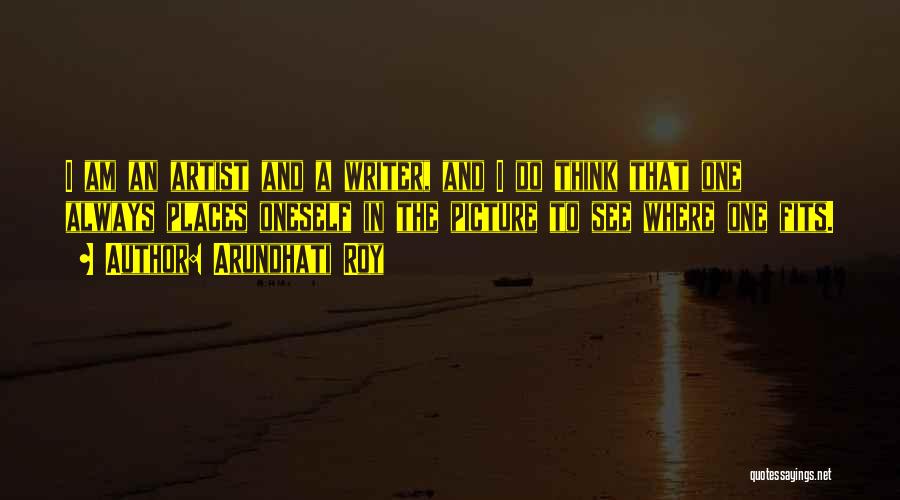
I am an artist and a writer, and I do think that one always places oneself in the picture to see where one fits. — Arundhati Roy
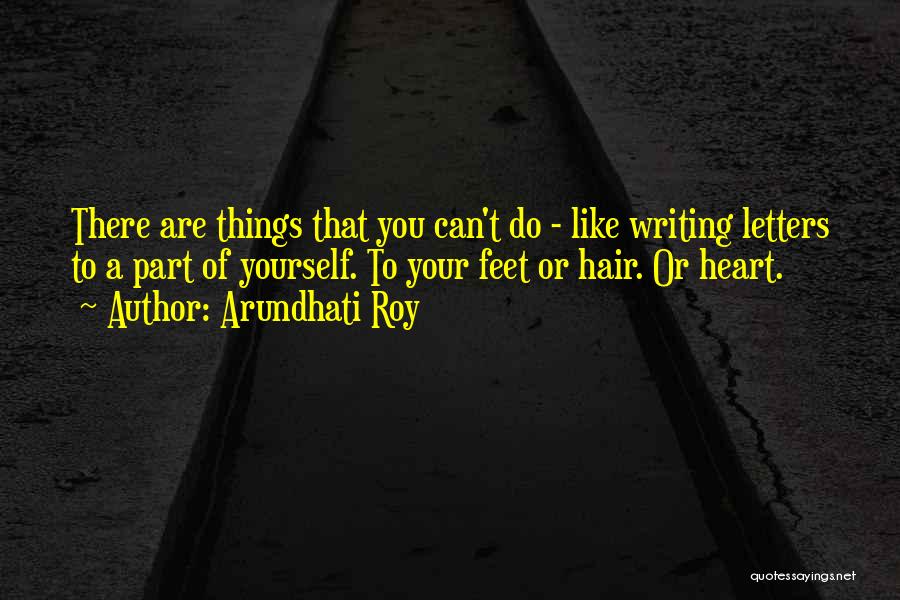
There are things that you can't do - like writing letters to a part of yourself. To your feet or hair. Or heart. — Arundhati Roy
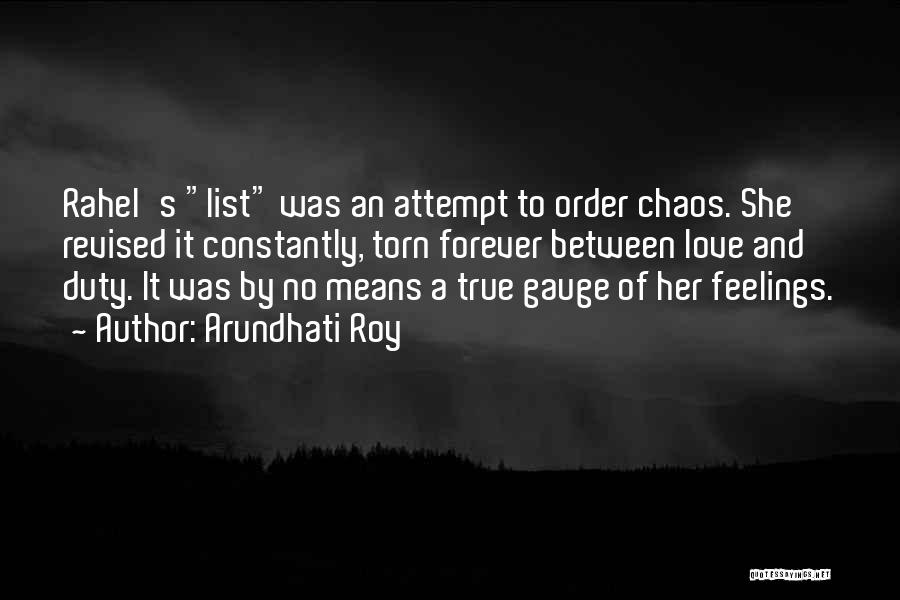
Rahel's "list" was an attempt to order chaos. She revised it constantly, torn forever between love and duty. It was by no means a true gauge of her feelings. — Arundhati Roy
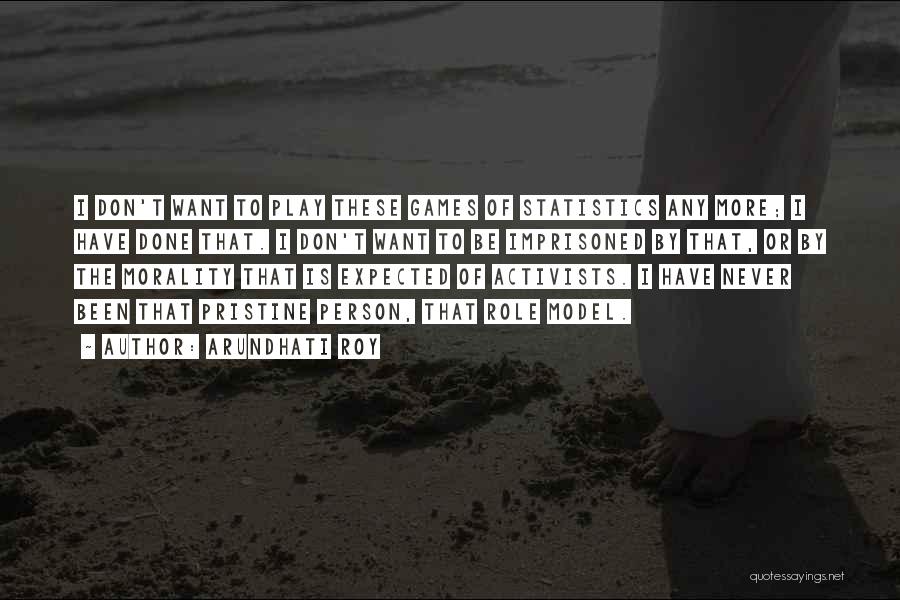
I don't want to play these games of statistics any more; I have done that. I don't want to be imprisoned by that, or by the morality that is expected of activists. I have never been that pristine person, that role model. — Arundhati Roy
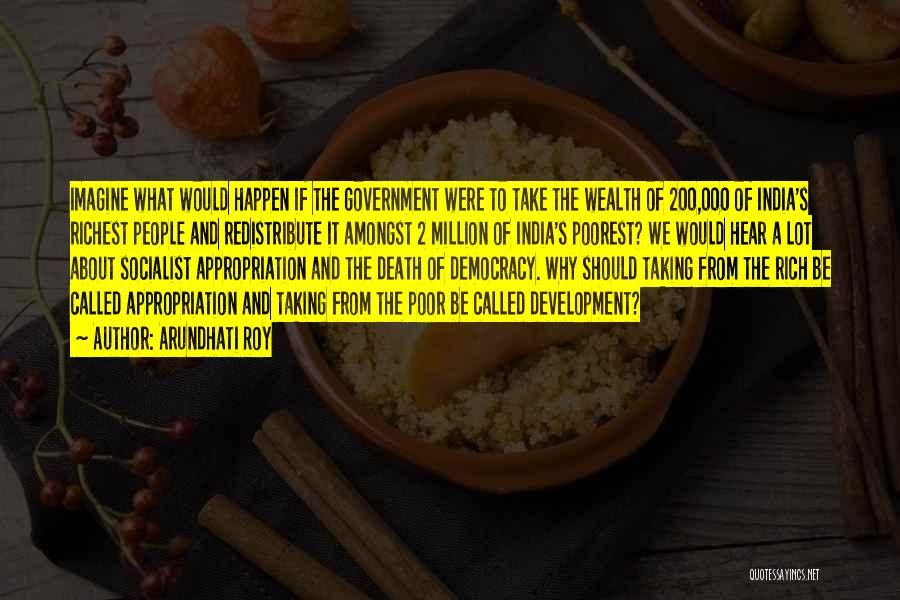
Imagine what would happen if the government were to take the wealth of 200,000 of India's richest people and redistribute it amongst 2 million of India's poorest? We would hear a lot about socialist appropriation and the death of democracy. Why should taking from the rich be called appropriation and taking from the poor be called development? — Arundhati Roy
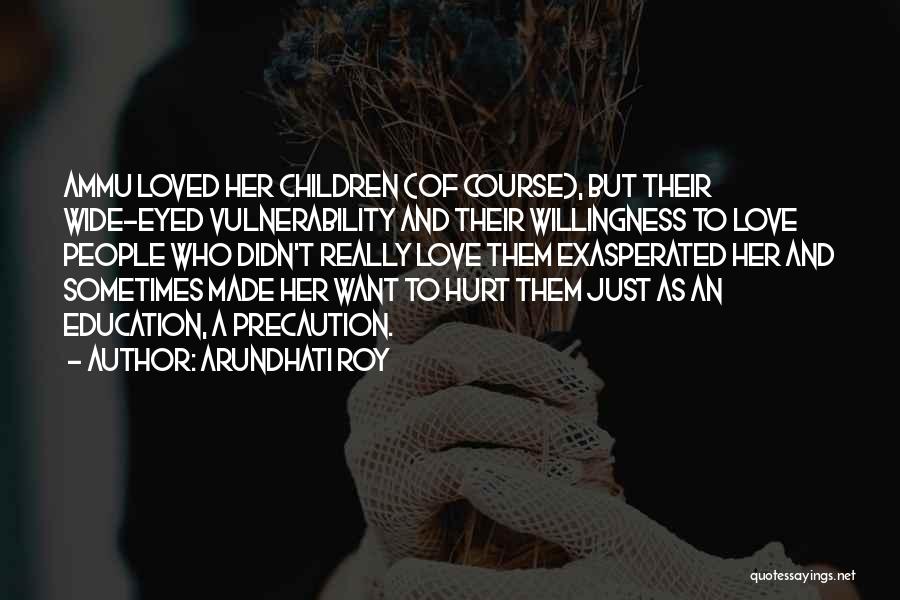
Ammu loved her children (of course), but their wide-eyed vulnerability and their willingness to love people who didn't really love them exasperated her and sometimes made her want to hurt them
just as an education, a precaution. — Arundhati Roy
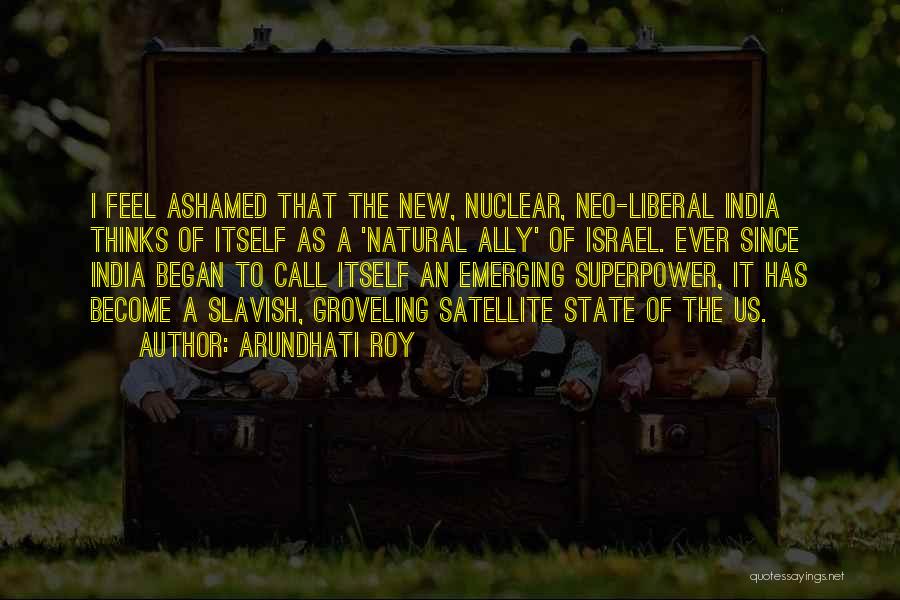
I feel ashamed that the new, nuclear, neo-liberal India thinks of itself as a 'natural ally' of Israel. Ever since India began to call itself an emerging superpower, it has become a slavish, groveling satellite state of the US. — Arundhati Roy

Some days he walked along the banks of the river that smelled of shit and pesticides bought with World Bank loans. — Arundhati Roy
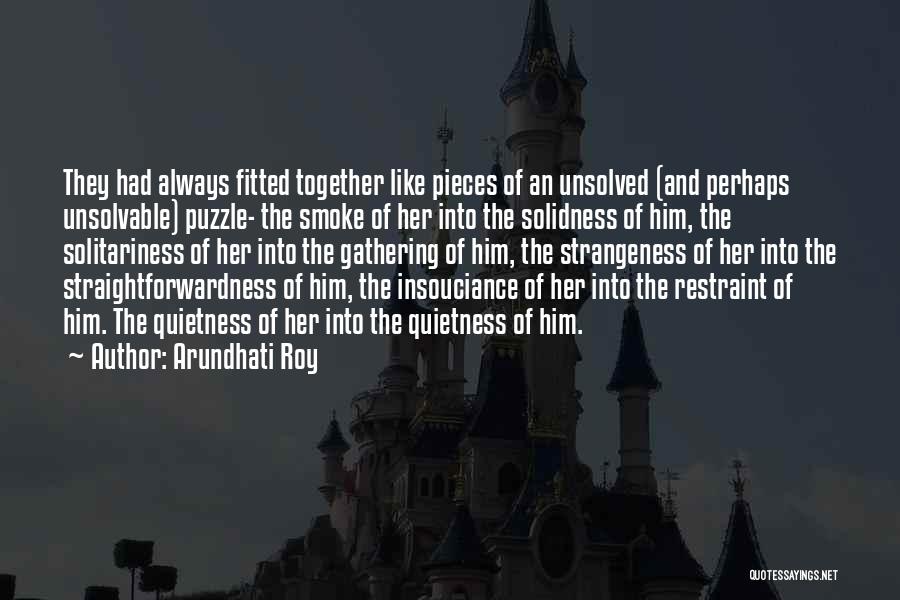
They had always fitted together like pieces of an unsolved (and perhaps unsolvable) puzzle- the smoke of her into the solidness of him, the solitariness of her into the gathering of him, the strangeness of her into the straightforwardness of him, the insouciance of her into the restraint of him. The quietness of her into the quietness of him. — Arundhati Roy
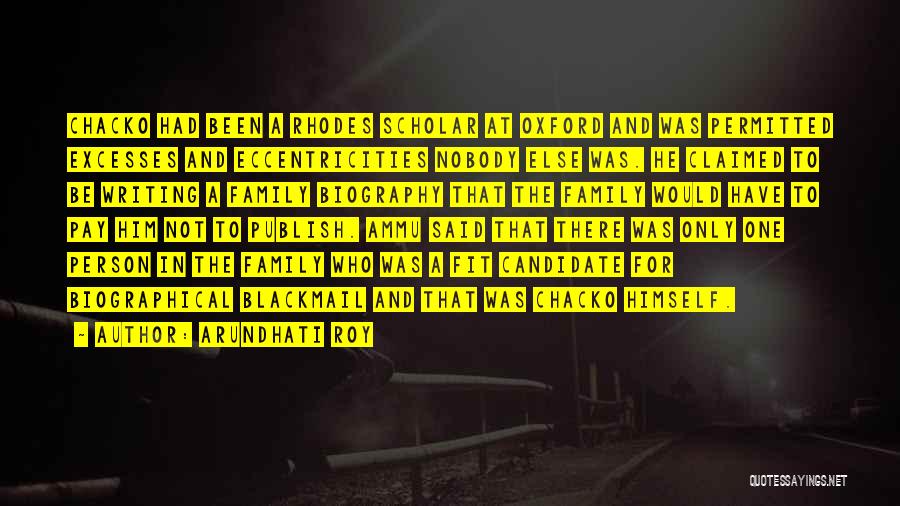
Chacko had been a Rhodes Scholar at Oxford and was permitted excesses and eccentricities nobody else was. He claimed to be writing a Family Biography that the Family would have to pay him not to publish. Ammu said that there was only one person in the family who was a fit candidate for biographical blackmail and that was Chacko himself. — Arundhati Roy
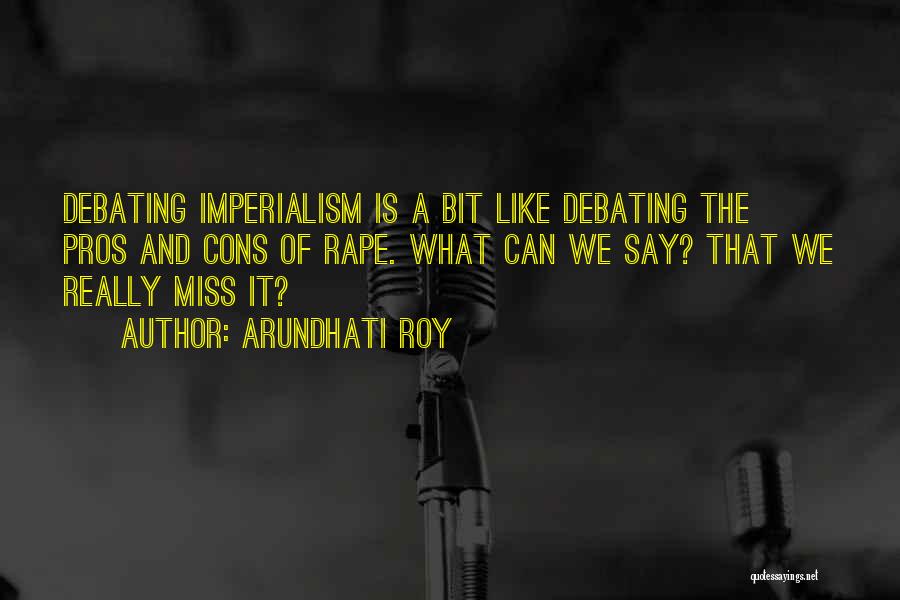
Debating Imperialism is a bit like debating the pros and cons of rape. What can we say? That we really miss it? — Arundhati Roy
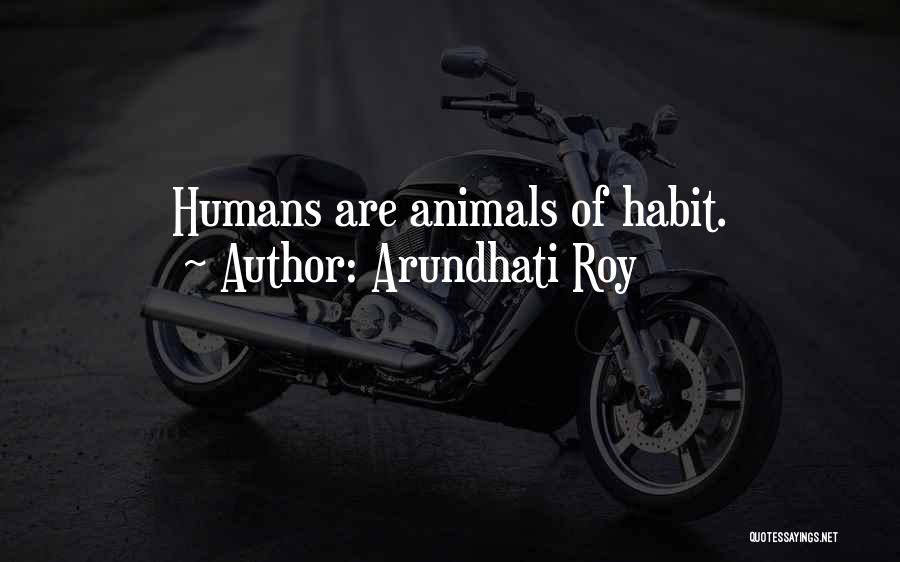
Humans are animals of habit. — Arundhati Roy
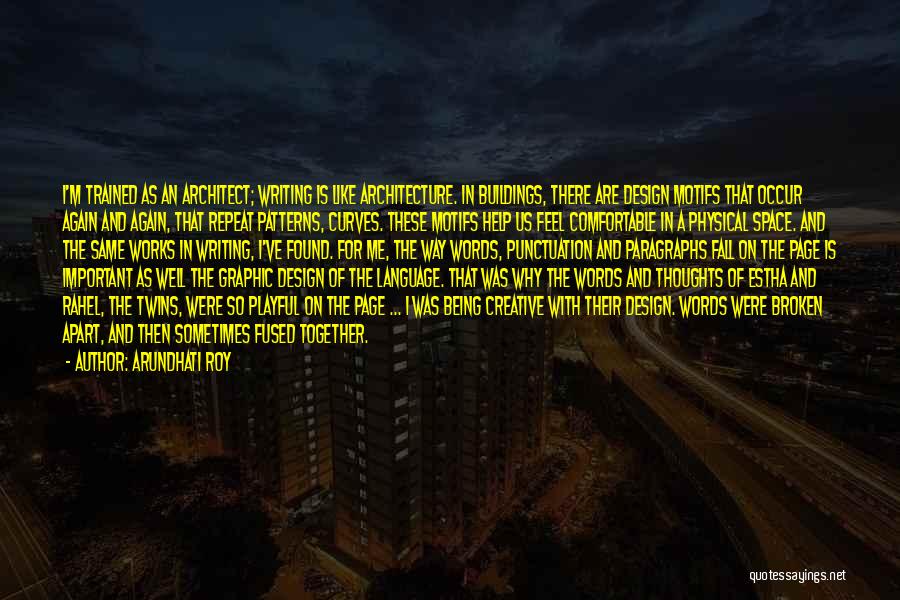
I'm trained as an architect; writing is like architecture. In buildings, there are design motifs that occur again and again, that repeat
patterns, curves. These motifs help us feel comfortable in a physical space. And the same works in writing, I've found. For me, the way words, punctuation and paragraphs fall on the page is important as well
the graphic design of the language. That was why the words and thoughts of Estha and Rahel, the twins, were so playful on the page ... I was being creative with their design. Words were broken apart, and then sometimes fused together. "Later" became "Lay. Ter." "An owl" became "A Nowl." "Sour metal smell" became "sourmetal smell."
Repetition I love, and used because it made me feel safe. Repeated words and phrases have a rocking feeling, like a lullaby. They help take away the shock of the plot
death, lives destroyed or the horror of the settings
a crazy, chaotic, emotional house, the sinister movie theater. — Arundhati Roy
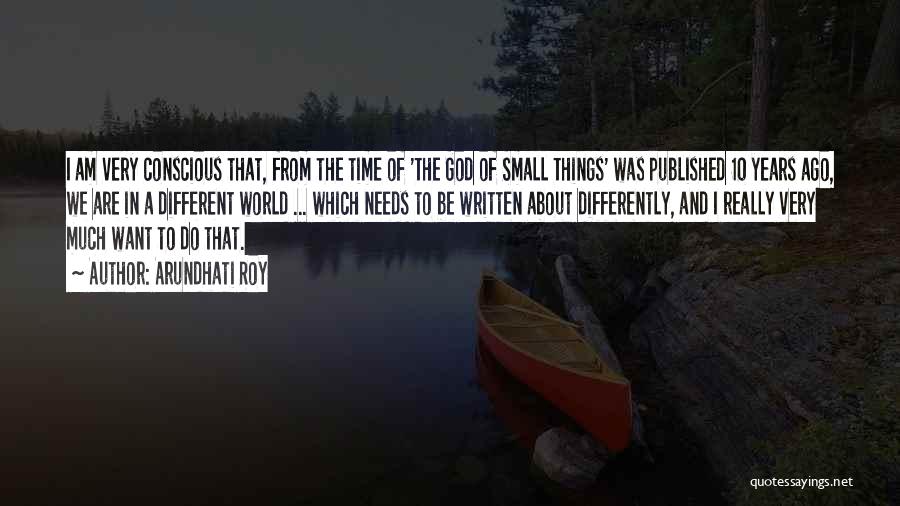
I am very conscious that, from the time of 'The God of Small Things' was published 10 years ago, we are in a different world ... which needs to be written about differently, and I really very much want to do that. — Arundhati Roy
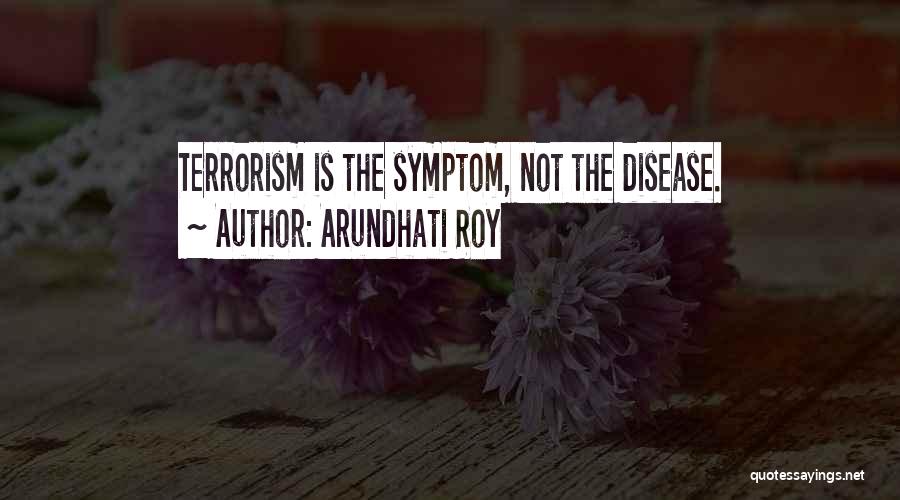
Terrorism is the symptom, not the disease. — Arundhati Roy
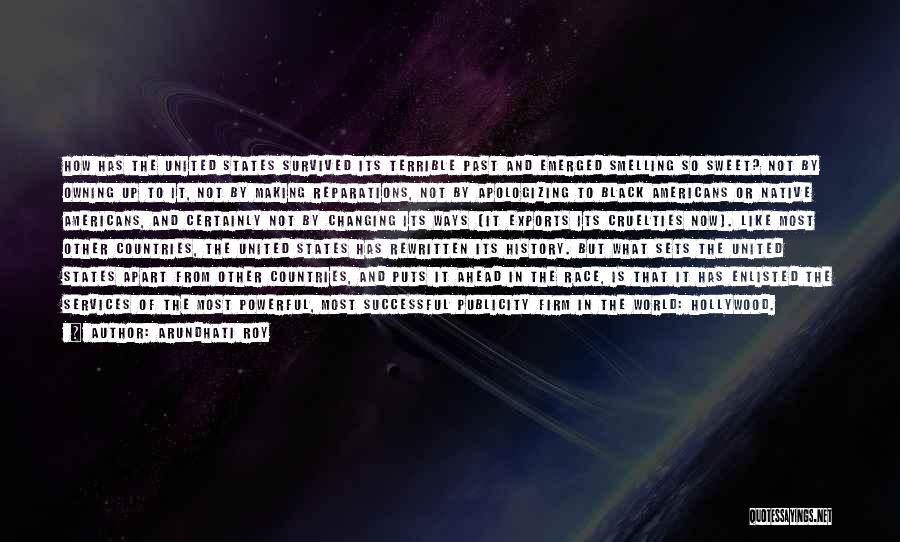
How has the United States survived its terrible past and emerged smelling so sweet? Not by owning up to it, not by making reparations, not by apologizing to black Americans or native Americans, and certainly not by changing its ways (it exports its cruelties now). Like most other countries, the United States has rewritten its history. But what sets the United States apart from other countries, and puts it ahead in the race, is that it has enlisted the services of the most powerful, most successful publicity firm in the world: Hollywood. — Arundhati Roy
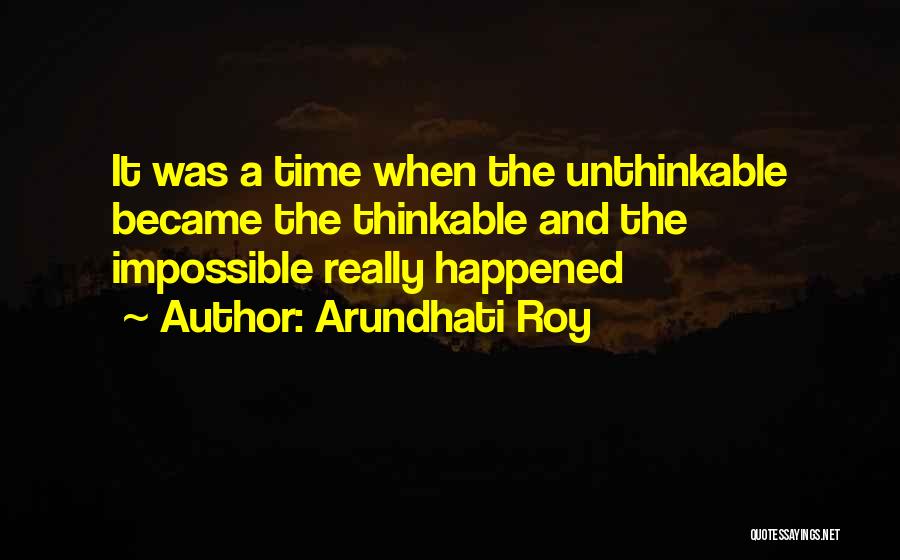
It was a time when the unthinkable became the thinkable and the impossible really happened — Arundhati Roy






